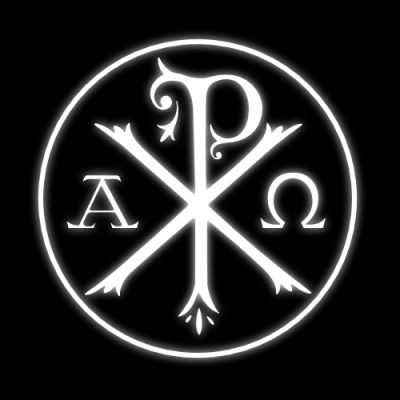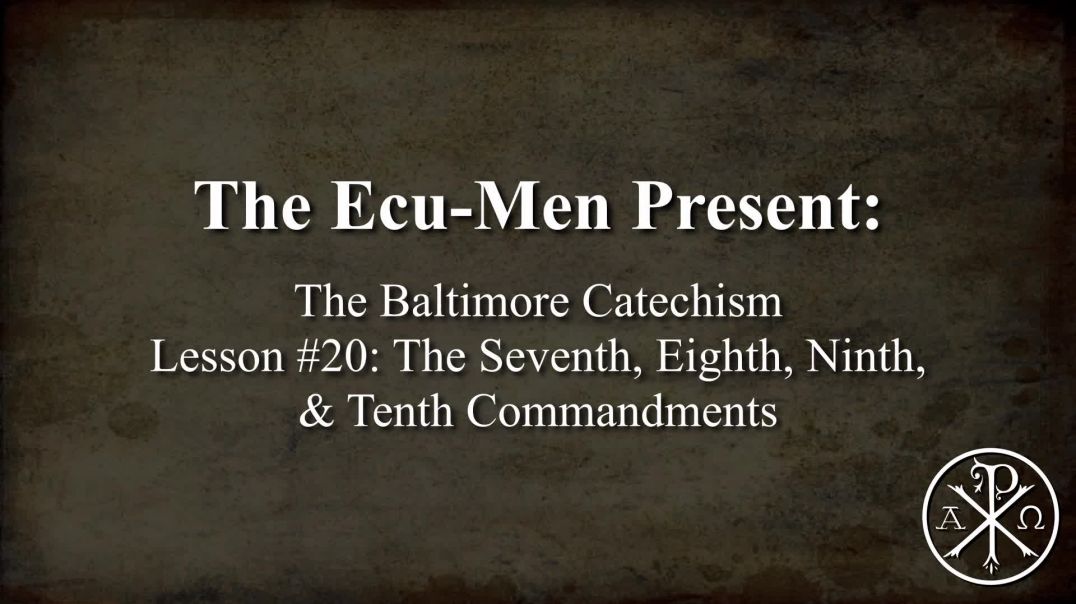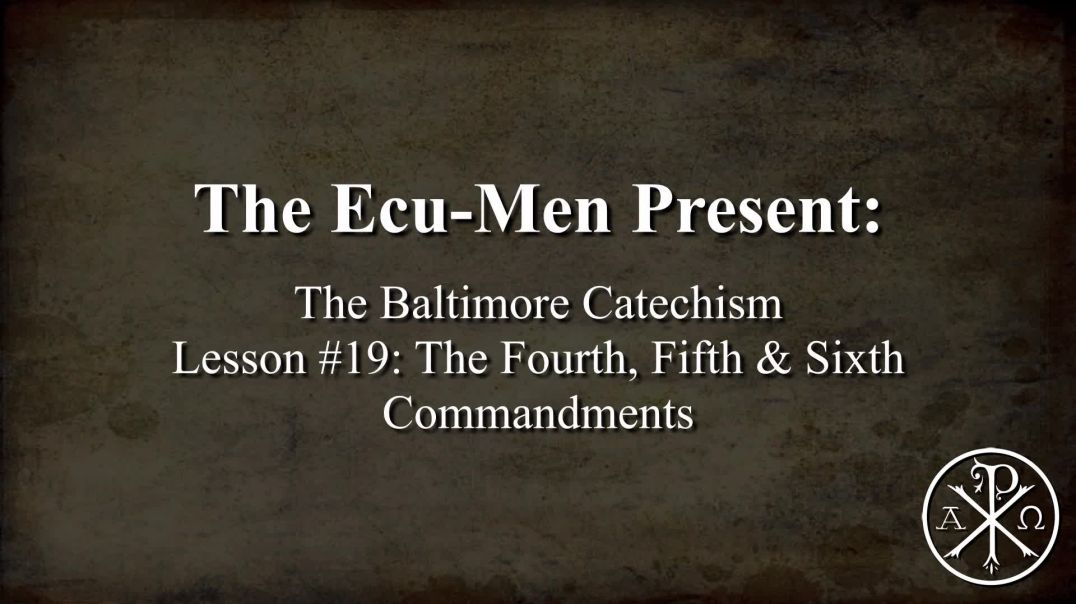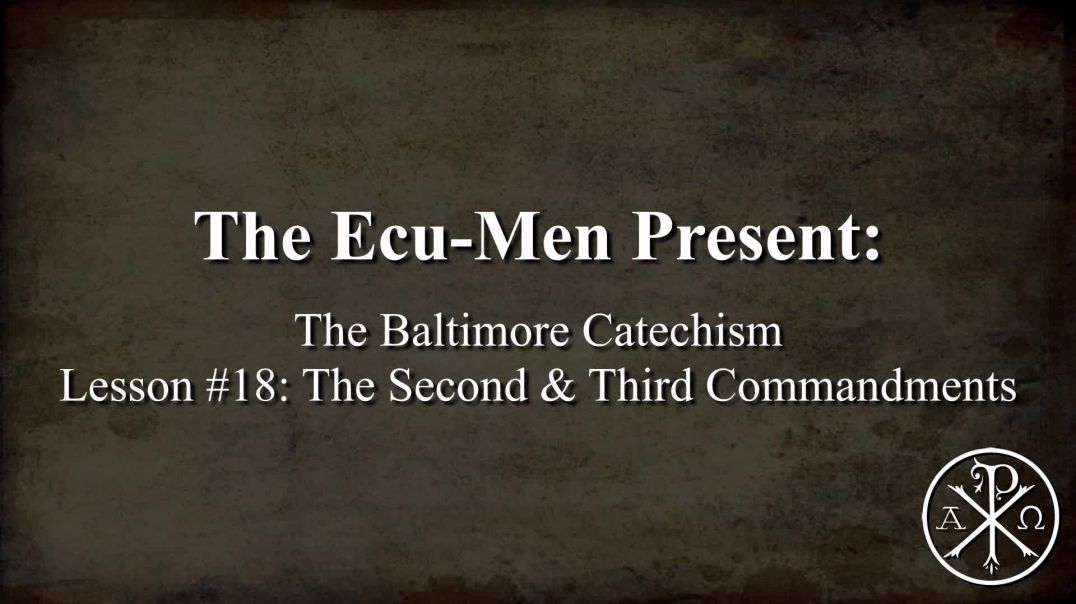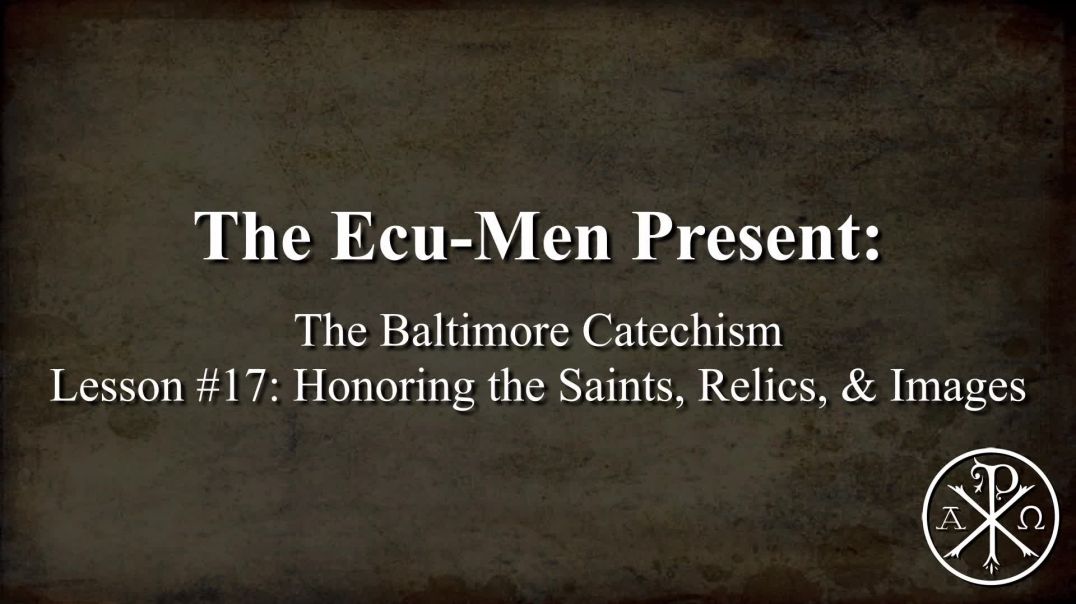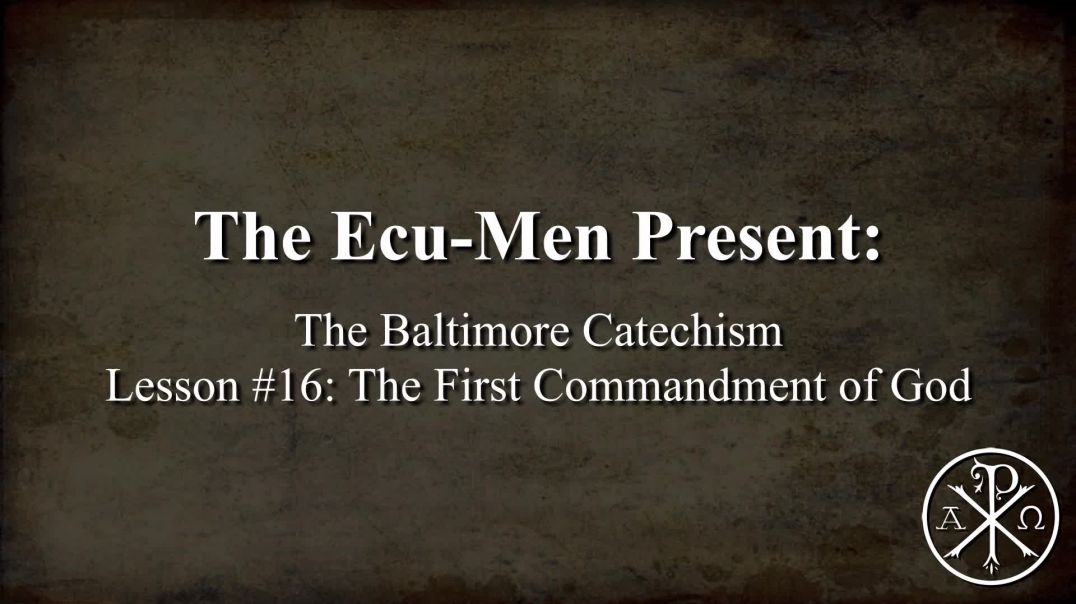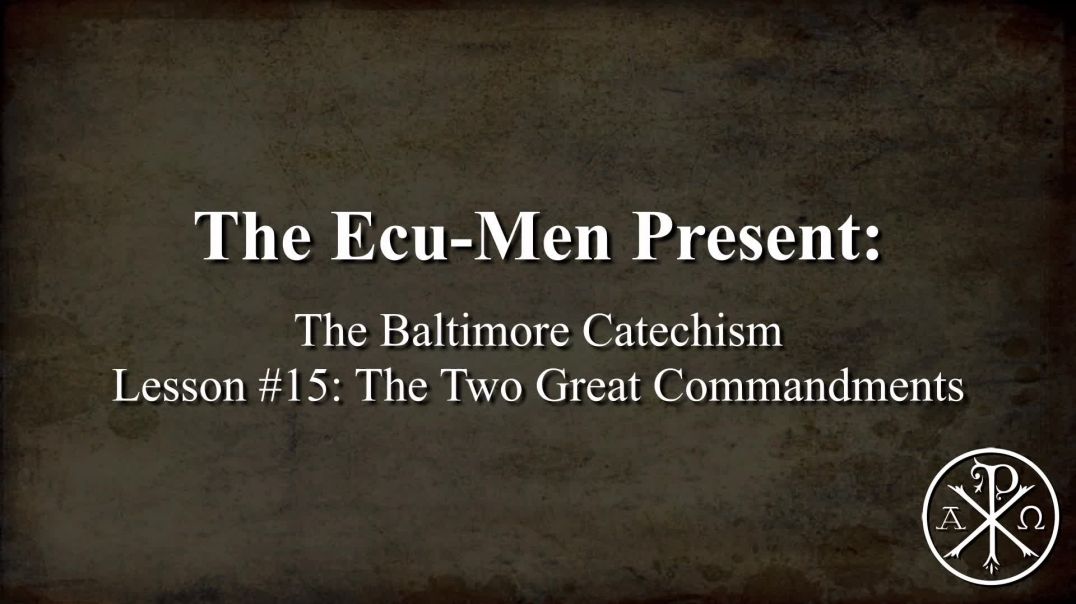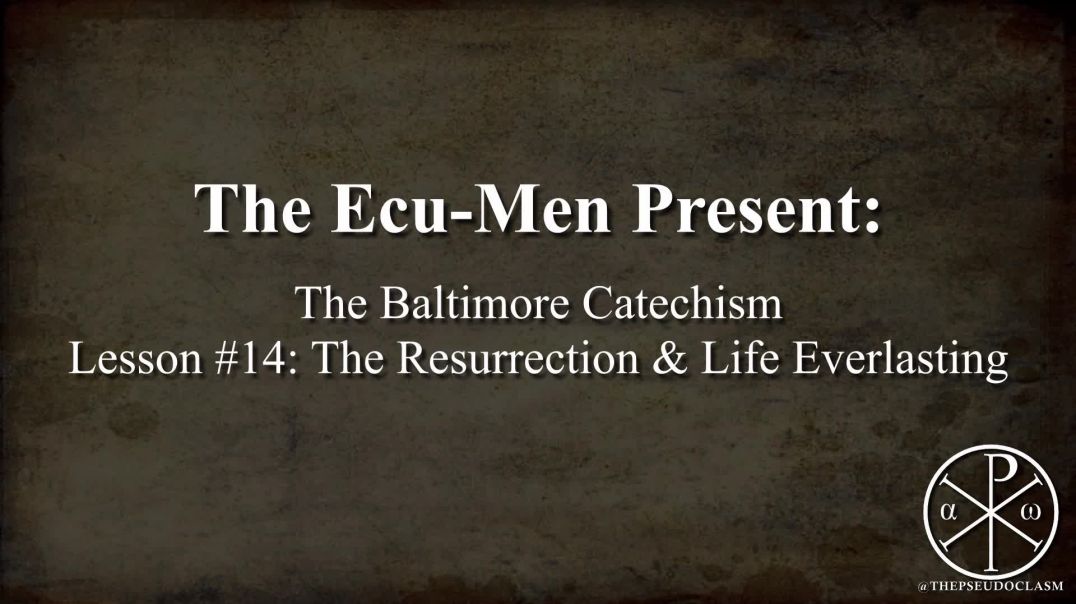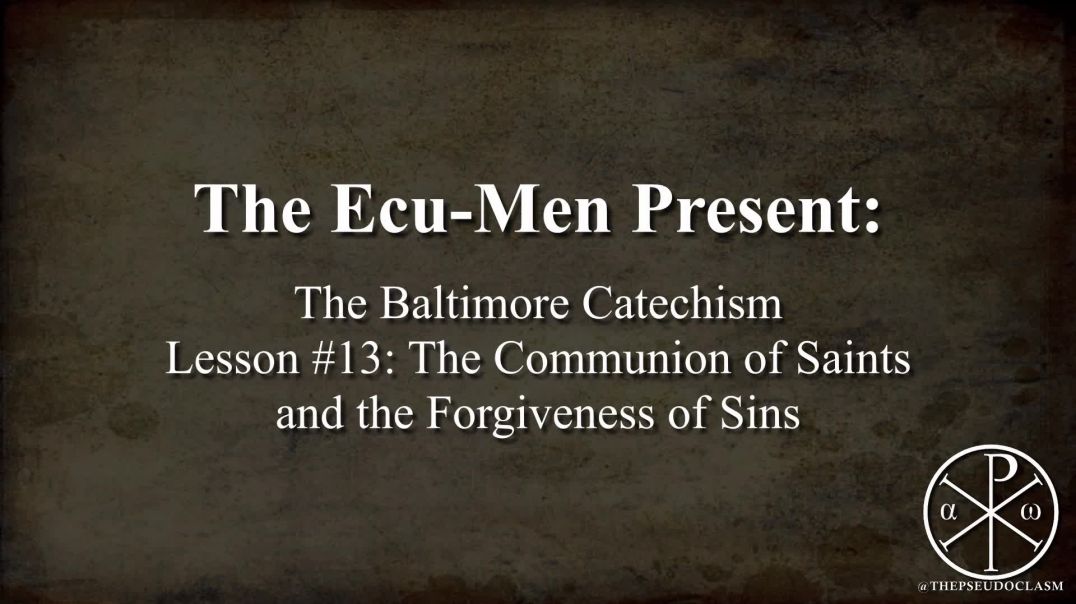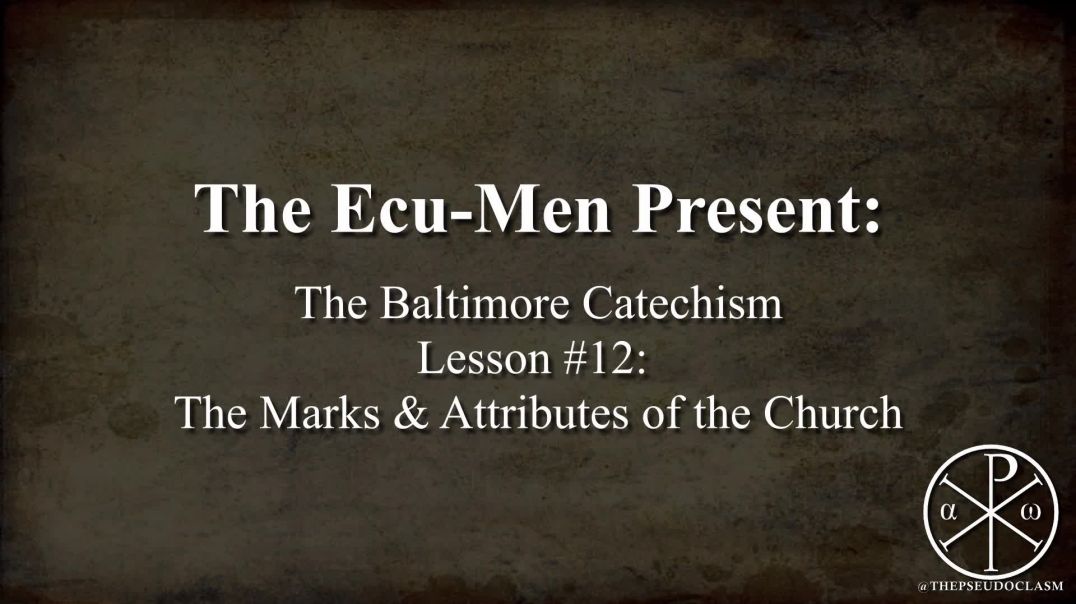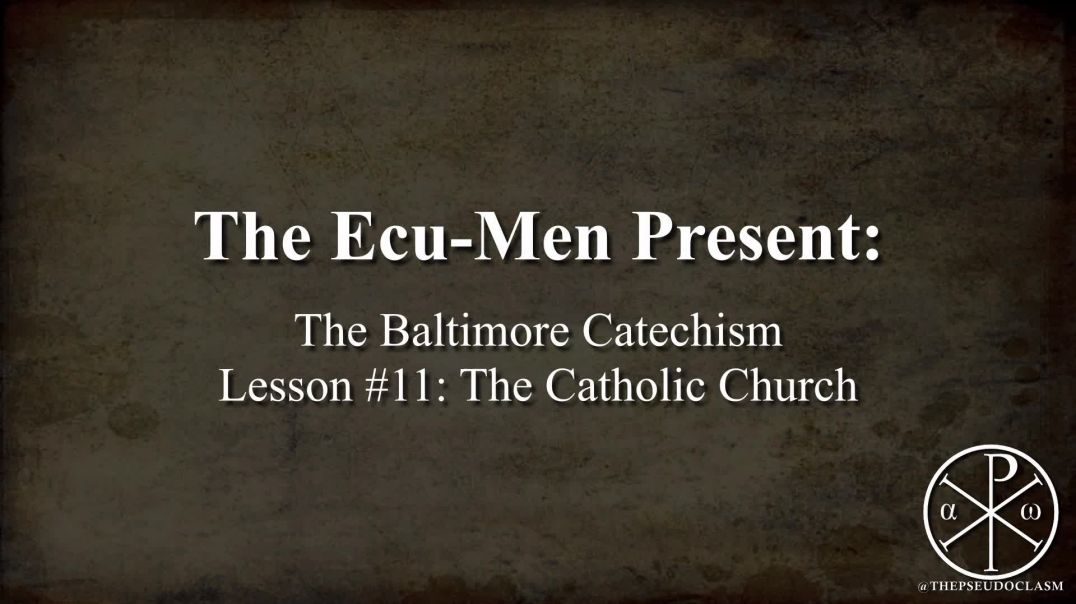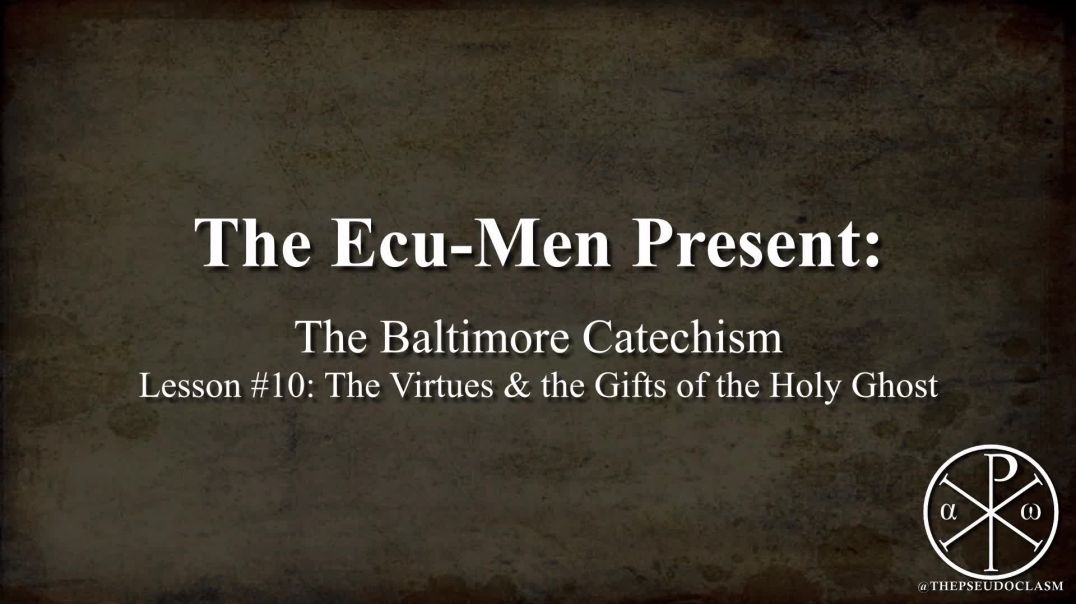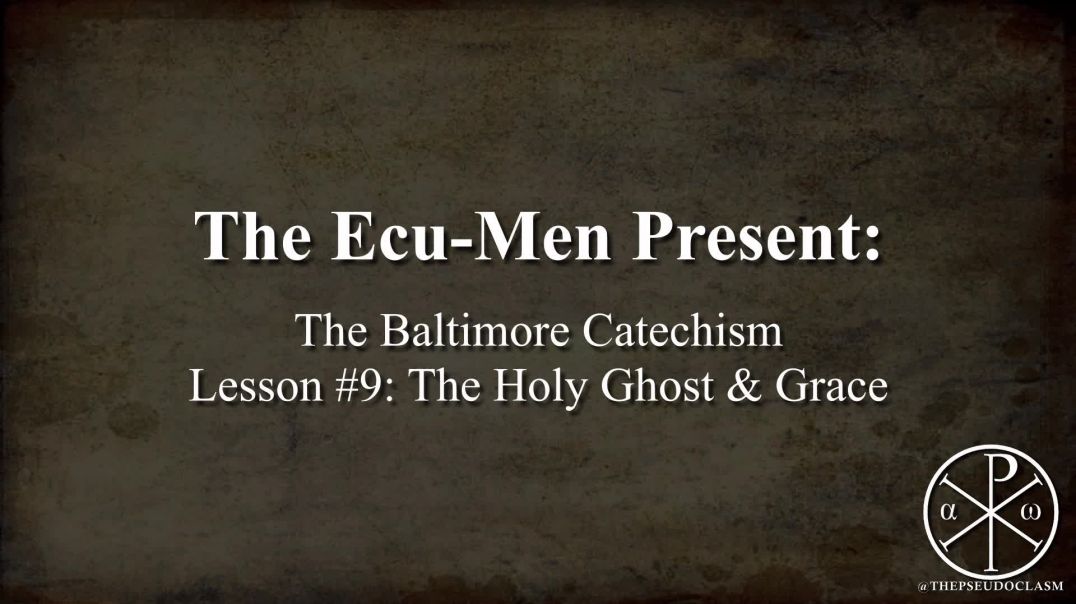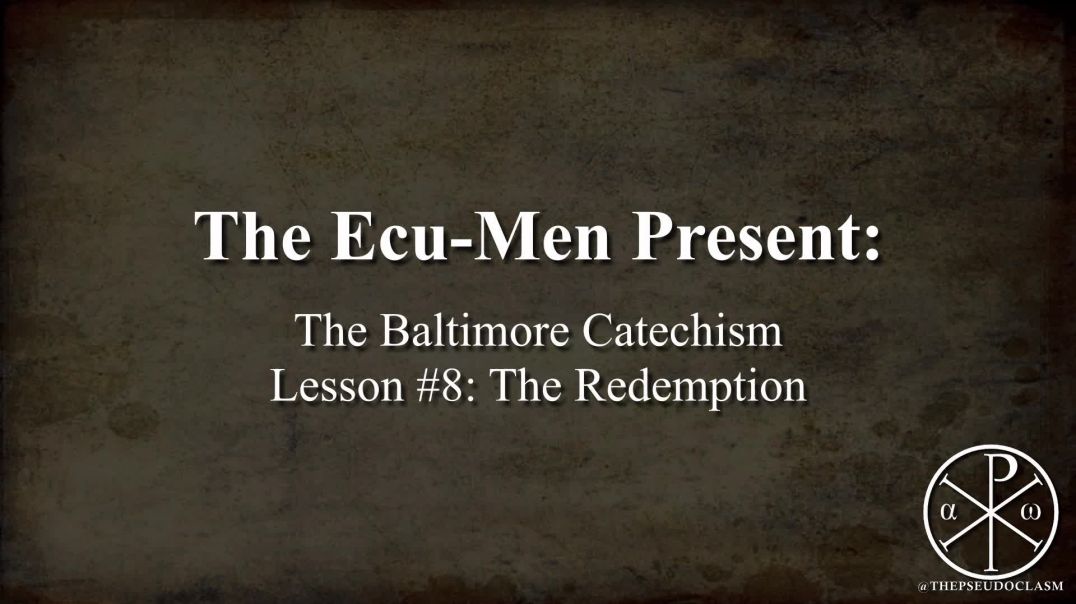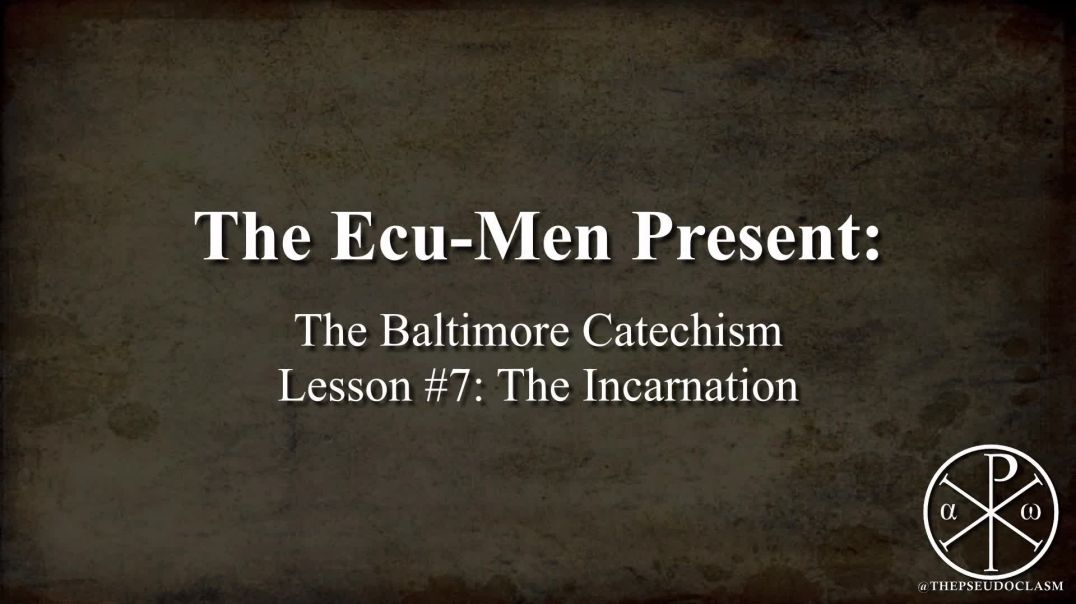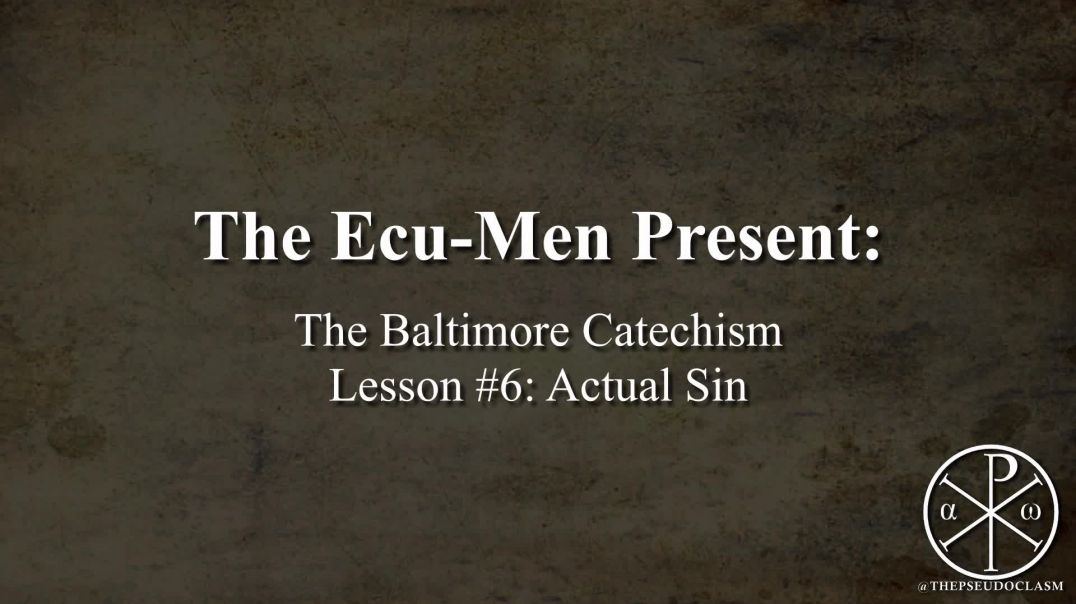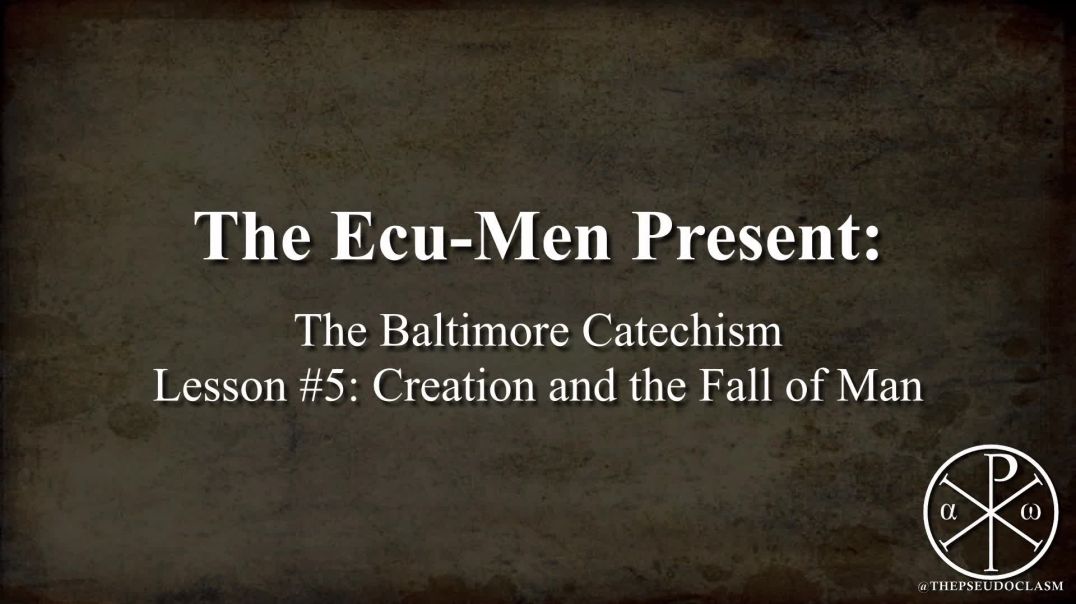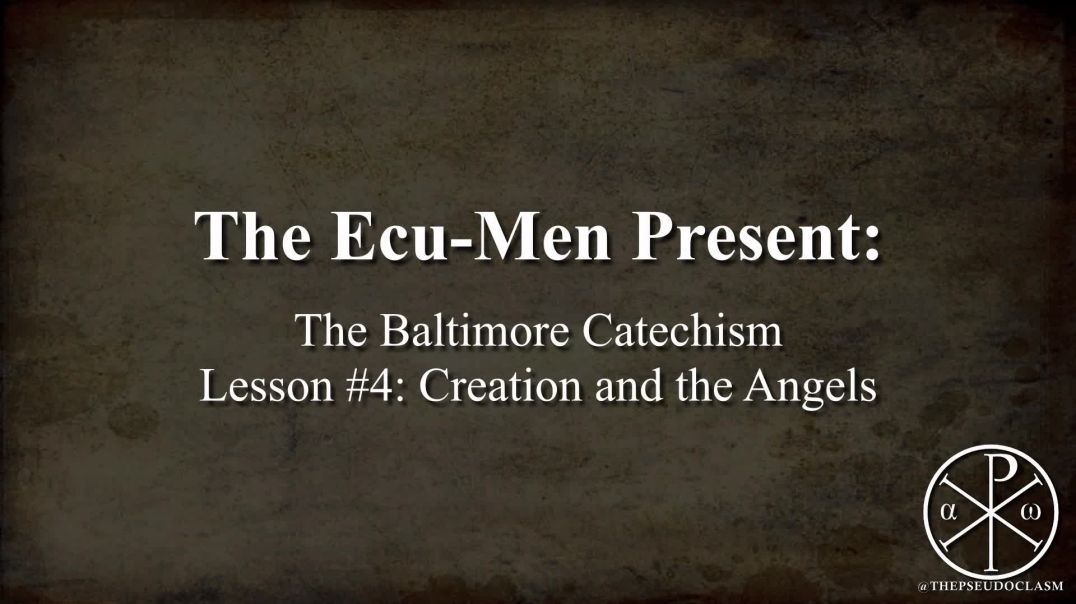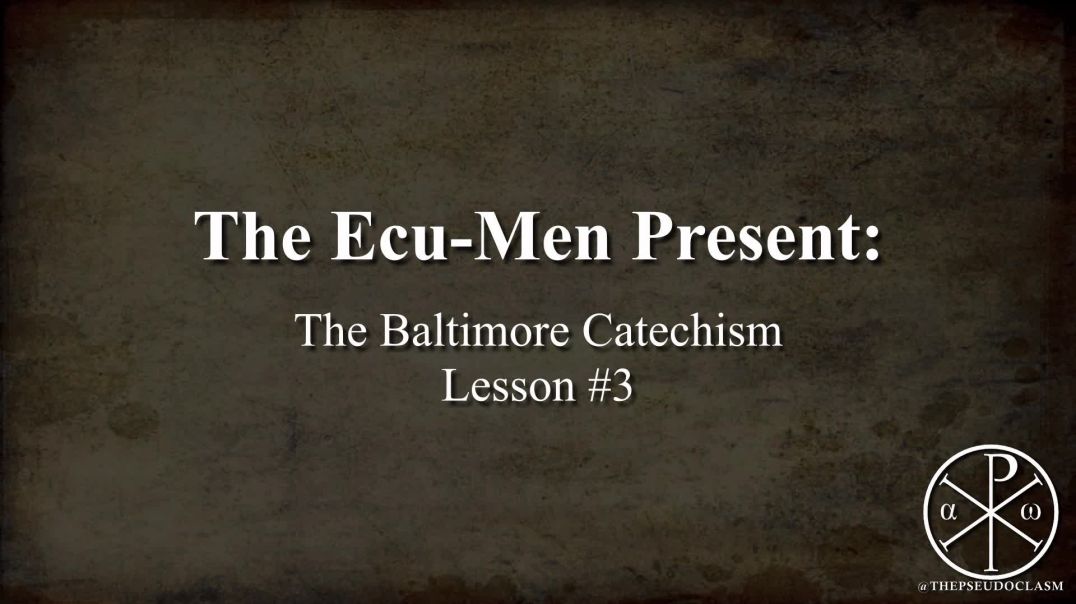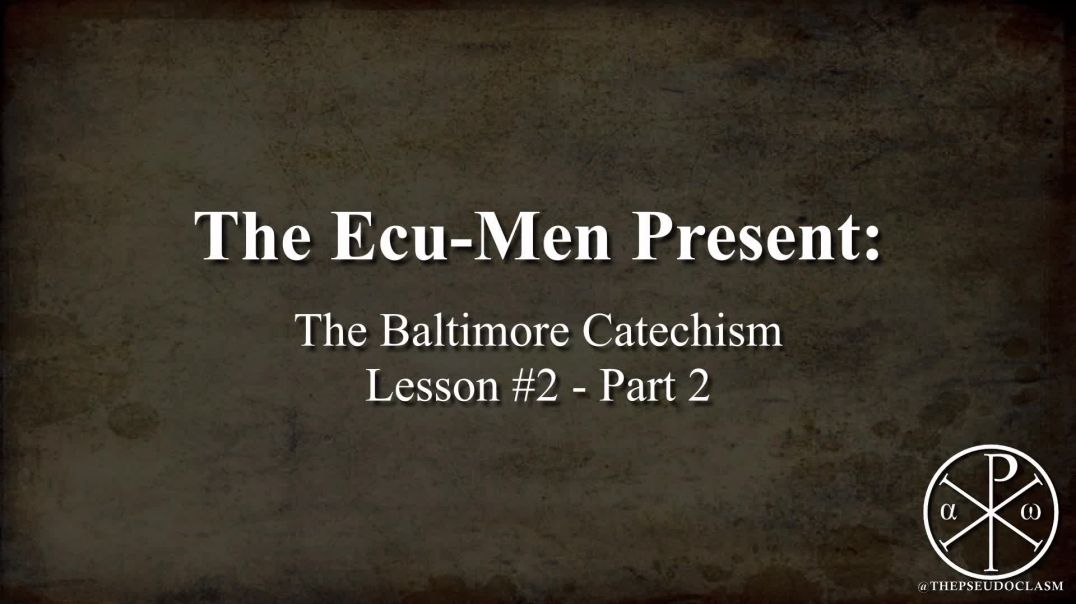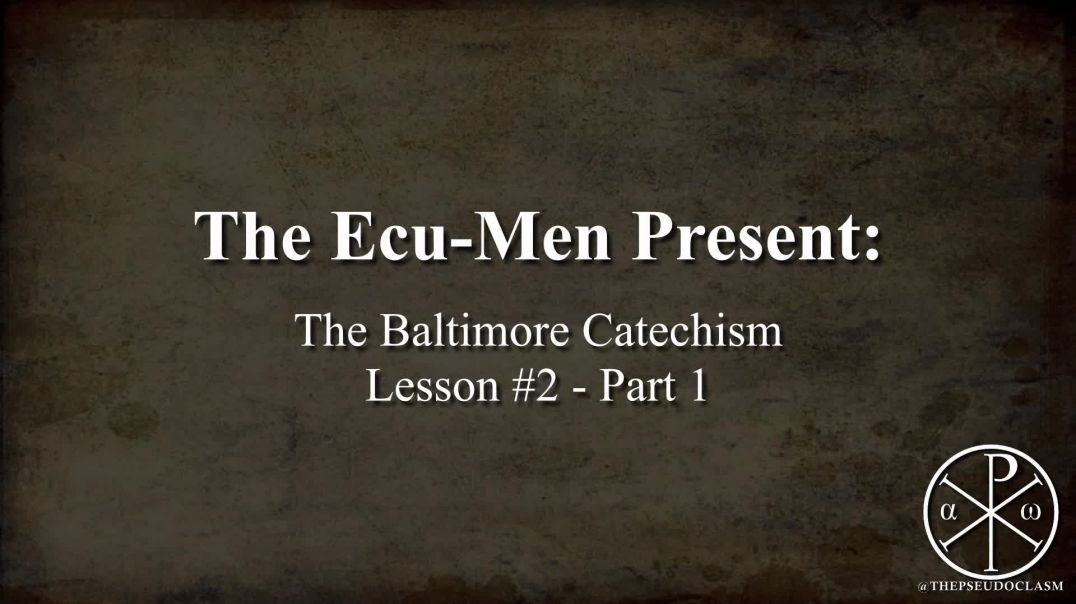Latest videos
On this episode we round out our discussion on the Ten Commandments and give you some insights on how the Church looks at them and how they apply today. Thanks for listening!
259. What is the seventh commandment of God?
The seventh commandment of God is: Thou shalt not steal. (Exodus 20:15)
260. What are we commanded by the seventh commandment?
We are commanded to respect what belongs to others, to live up to our business agreements, and to pay our just debts. (Proverbs 16:8)
261. What does the seventh commandment forbid?
Besides stealing, it forbids cheating, unjust keeping of what belongs to others, unjust damage to the property of others, and the accepting of bribes by public officials. (Leviticus 19:35-36)
262. Are we obliged to restore to the owner stolen goods, or their value?
We are obliged to restore to the owner stolen goods, or their value, whenever we are able. (Exodus 22:1)
263. Are we obliged to repair damage unjustly done to the property of others?
We are obliged to repair damage unjustly done to the property of others, or to pay the amount of the damage, as far as we are able. (Exodus 22:5)
264. What is the eighth commandment of God?
The eighth commandment of God is: Thou shalt not bear false witness against thy neighbor. (Exodus 20:16)
265. What are we commanded by the eighth commandment?
We are commanded to speak the truth in all things, but especially in what concerns the good name and honor of others. (Ephesians 4:25)
266. What does the eighth commandment forbid?
It forbids lies, rash judgment, detraction, calumny, and the telling of secrets we are bound to keep. (Proverbs 12:22)
267. When does a person commit the sin of rash judgment?
When, without sufficient reason, he believes something harmful to another's character.
Before thou inquire, blame no man. (Ecclesiasticus 11:7)
268. When does a person commit the sin of detraction?
When, without a good reason, he makes known the hidden faults of another. (Proverbs 22:1)
269. When does a person commit the sin of calumny or slander?
When by lying he injures the good name of another. (Ecclesiasticus 7:13)
270. When are we obliged to keep a secret?
When we have promised to do so, when our office requires it, or when the good of another demands it.
271. What must a person do who has sinned by detraction or calumny, or has told a secret he is bound to keep?
A person must repair the harm he has done to his neighbor, as far as he is able.
272. What is the ninth commandment of God?
The ninth commandment of God is: Thou shalt not covet thy neighbor's wife. (Deuteronomy 5:21)
273. What are we commanded by the ninth commandment?
We are commanded to be pure in thought and desire. (Matthew 5:8)
274. Are mere thoughts about impure things always sinful in themselves?
Mere thoughts about impure things are not always sinful in themselves, but such thoughts are dangerous.
275. When do thoughts about impure things become sinful?
When a person thinks of an unchaste act and deliberately takes pleasure in so thinking, or when unchaste desire or passion is aroused and consent is given to it.
276. What is forbidden by the ninth commandment?
It forbids all thoughts and desires contrary to chastity.
277. What is the tenth commandment of God?
The tenth commandment of God is: Thou shalt not covet thy neighbor's goods.
Thou shalt not covet thy neighbor's wife, nor his house. (Deuteronomy 5:21)
278. What does the tenth commandment forbid?
It forbids all desire to take or to keep unjustly what belongs to others, and also forbids envy at their success. (Luke 12:15)
=======
Reference, examination of conscience from Fr Isaac Relyea: https://www.youtube.com/watch?v=grzOYoE5I7M&list=PLwNiStFuOSrtk-6O2dS3arK9_Qu2FaMBG&index=46
Thorough examination of conscience: https://bit.ly/34N8uFN
+JMJ+
Here on the next lesson of the Baltimore Catechism presented by the Ecu-Men, we cover the Fourth, Fifth, & Sixth Commandments; really important these days. If you want to understand why society is breaking down at this moment, you’ll want to listen to this episode, since very little of this topic is addressed at all these days. Thanks for listening!
241. What is the fourth commandment of God?
Honor thy father and thy mother. (Exodus 20:12)
242. What are we commanded by the fourth commandment?
To respect and love our parents, to obey them in all that is not sinful, and to help them when they are in need. (Ephesians 6:1)
243. Does the fourth commandment oblige us to respect and to obey others besides our parents?
Besides our parents, the fourth commandment obliges us to respect and obey all our lawful superiors. (Romans 13:1-2)
244. What duty have parents toward their children and superiors toward those under their care?
Parents must provide for the spiritual and bodily welfare of their children; superiors, according to their varying degrees of responsibility, must care for those entrusted to them. (Ephesians 6:4)
245. What are the duties of a citizen toward his country?
Be sincerely interested in its welfare, and respect and obey its lawful authority.
246. How does a citizen show a sincere interest in his country's welfare?
By voting honestly and without selfish motives, by paying just taxes, and by defending his country's rights when necessary.
247. Why must we respect and obey the lawful authority of our country?
Because it comes from God, the Source of all authority.
248. Why are we obliged to take an active part in works of good citizenship?
Because right reason requires citizens to work together for the public welfare of the country.
249. What are the chief duties of those who hold public office?
To be just to all in exercising their authority and to promote the general welfare. (Wisdom 6:3-4)
250. What does the fourth commandment forbid?
Disrespect, unkindness, and disobedience to our parents and lawful superiors. (Deuteronomy 27:16)
251. What is the fifth commandment of God?
The fifth commandment of God is: Thou shalt not murder. (Exodus 20:13)
252. What are we commanded by the fifth commandment?
To take proper care of our own spiritual and bodily well-being and that of our neighbor.
253. What does the fifth commandment forbid?
Murder and suicide, and also fighting, anger, hatred, revenge, drunkenness, reckless driving, and bad example. (I John 3:15)
254. What is the sixth commandment of God?
The sixth commandment of God is: Thou shalt not commit adultery. (Exodus 20:14)
255. What are we commanded by the sixth commandment?
We are commanded to be pure and modest in our behavior. (Romans 12:1)
256. What does the sixth commandment forbid?
The sixth commandment forbids all impurity and immodesty in words, looks, and actions, whether alone or with others. (Ephesians 5:3)
257. What are the chief dangers to the virtue of chastity?
Idleness, sinful curiosity, bad companions, drinking, immodest dress, and indecent books, plays, and motion pictures.
258. What are the chief means of preserving the virtue of chastity?
To avoid carefully all unnecessary dangers, to seek God's help through prayer, frequent confession, Holy Communion, and assistance at Holy Mass, and to have a special devotion to the Blessed Virgin. (I Peter 5:8)
=======
Baltimore Catechism, Lesson 19:
https://www.catholicity.com/ba....ltimore-catechism/le
Leo XIII: On Capital & Labor:
https://bit.ly/3366bdh
Leo XIII: On Socialism:
https://bit.ly/3nLe6o6
Romans 13:1-4:
https://bit.ly/3flbQ49
Frederick Engels, Origin of the Family...
https://bit.ly/394PD9j
Lenin, against the family…
https://bit.ly/2HnQsi0
Here on the next lesson of the Baltimore Catechism presented by the Ecu-Men, we cover the Second and Third Commandments, namely refraining from blasphemy & preserving the Lord’s Holy Day (Sunday). This stuff isn’t taught all that well these days, so find out how much you remember. Thanks for listening!
224. What is the second commandment of God?
Thou shalt not take the name of the Lord thy God in vain. (Exodus 20:7)
225. What are we commanded by the second commandment?
Always to speak with reverence of God, of the saints, and of holy things, and to be truthful in taking oaths and faithful to them and to our vows. (Psalm 112:2-3)
226. What is an oath?
An oath is the calling on God to witness the truth of what we say. (Hebrews 6:16)
227. What things are necessary to make an oath lawful?
Three things are necessary: first, we must have a good reason for taking an oath; second, we must be convinced that what we say under oath is true; third, we must not swear, that is, take an oath, to do what is wrong. (Jeremiah 4:2)
228. What great sin does a person commit who deliberately calls on God to bear witness to a lie?
The very grievous sin of perjury. (Leviticus 19:12)
229. What is a vow?
A deliberate promise made to God by which a person binds himself under pain of sin to do something that is especially pleasing to God. (Deuteronomy 23:21)
230. What is meant by taking God's name in vain?
That the name of God or the holy name of Jesus Christ is used without reverence; for example, to express surprise or anger. (Psalm 112:2-3)
231. Is it a sin to take God's name in vain?
Yes. It is a sin to take God's name in vain; ordinarily, it is a venial sin.
232. What is cursing?
Cursing is the calling down of some evil on a person, place, or thing. (Romans 12:14)
233. What is blasphemy?
Blasphemy is insulting language which expresses contempt for God, either directly or through His saints and holy things. (Mark 3:28-30)
234. What is the third commandment of God?
Remember thou keep holy the Lord's day. (Genesis 2:2)
235. Why does the Church command us to keep Sunday as the Lord's day?
Because on Sunday Christ rose from the dead, and on Sunday the Holy Ghost descended upon the apostles.
236. What are we commanded by the third commandment?
We are commanded to worship God in a special manner on Sunday, the Lord's day. (Exodus 31:14)
237. How does the Church command us to worship God on Sunday?
By assisting at the Holy Sacrifice of the Mass.
238. What is forbidden by the third commandment of God?
All unnecessary servile work on Sunday is forbidden. (Exodus 31:15)
239. What is servile work?
Servile work is that which requires labor of body rather than of mind.
240. When is servile work allowed on Sunday?
Servile work is allowed on Sunday when the honor of God, our own need, or that of our neighbor requires it.
=======
Baltimore Catechism, Lesson 18:
https://www.catholicity.com/ba....ltimore-catechism/le
Baptismal Vows:
https://bit.ly/3juYrqp
Preternatural:
https://bit.ly/2IRWKXx
Acedia/Noon-day Devil:
https://amzn.to/2FTF6BA
The Incredible Catholic Mass:
https://bit.ly/3jrUxyN
Restoring the Faith: Fasting
https://bit.ly/3mkGPzr
Here on the next lesson of the Baltimore Catechism presented by the Ecu-Men, we expand on the First Commandment as we talk about Honoring the Saints, Relics, & Images. We have many people who have come before us as examples for good behavior; and we have blessed objects from God which He has made good. There is a lot here on this interesting topic to cover. Thanks for listening!
214. Does the first commandment forbid us to honor the saints in heaven?
The first commandment does not forbid us to honor the saints in heaven, provided we do not give them the honor that belongs to God alone. (Luke 1:48)
215. Why do we honor the saints in heaven?
Because they practiced great virtue when they were on earth, and because in honoring those who are the chosen friends of God we honor God Himself.
216. How can we honor the saints?
We can honor the saints: first, by imitating their holy lives; second, by praying to them; third, by showing respect to their relics and images. (Philippians 3:17)
217. When we pray to the saints what do we ask them to do?
When we pray to the saints we ask them to offer their prayers to God for us.
218. How do we know that the saints will pray for us?
We know that the saints will pray for us because they are with God and have great love for us.
219. Why do we honor relics?
We honor relics because they are the bodies of the saints or objects connected with the saints or with Our Lord.
220. When does the first commandment forbid the making or the use of statues and pictures?
The first commandment forbids the making or the use of statues and pictures only when they promote false worship. (Exodus 20:3-4)
221. Is it right to show respect to the statues and pictures of Christ and of the saints?
It is right to show respect to the statues and pictures of Christ and of the saints, just as it is right to show respect to the images of those whom we honor or love on earth.
222. Do we honor Christ and the saints when we pray before the crucifix, relics, and sacred images?
We honor Christ and the saints when we pray before the crucifix, relics, and sacred images because we honor the persons they represent; we adore Christ and venerate the saints.
223. Do we pray to the crucifix or to the images and relics of the saints?
We do not pray to the crucifix or to the images and relics of the saints, but to the persons they represent.
=======
Baltimore Catechism, Lesson 17:
https://www.catholicity.com/ba....ltimore-catechism/le
Magnificat:
https://en.wikipedia.org/wiki/Magnificat
John the Baptist & Only the Violent Conquer Heaven:
https://bit.ly/2RH6WU8
The Church Militant:
https://bit.ly/32JzthX
Septuagint:
https://www.newadvent.org/cathen/13722a.htm
Bones of Elisha:
https://bit.ly/33G8Aeb
St George:
https://en.wikipedia.org/wiki/Saint_George
Bathsheeba & Solomon:
https://bit.ly/2ZO00J1
Statues in Temple:
https://bit.ly/32HLk0a
Moses & Bronze Serpent:
https://bit.ly/32LZ0qV
Hail Mary in Bible:
https://bit.ly/3mJgNqT
Council of Ephesus:
https://bit.ly/3hLDPtl
The Rosary Mediations:
https://bit.ly/2RI1uQI
Here on the next lesson of the Baltimore Catechism presented by the Ecu-Men, we cover the topic, the First of the Ten Commandments. This is how we put God first, above all else. Thanks for listening!
198. What is the first commandment of God?
I am the Lord thy God; thou shalt not have strange gods before Me. (Exodus 20:3-4)
199. What are we commanded by the first commandment?
To offer to God alone the supreme worship that is due Him. (Luke 4:8)
200. How do we worship God?
By acts of faith, hope, and charity, and by adoring Him and praying to Him.
201. What does faith oblige us to do?
First, to make efforts to find out what God has revealed; second, to believe firmly what God has revealed; third, to profess our faith openly whenever necessary. (Matthew 10:32)
202. What does hope oblige us to do?
To trust firmly that God will give us eternal life and the means to obtain it. (Titus 1:1-2)
203. What does charity oblige us to do?
To love God above all things because He is infinitely good, and to love our neighbor as ourselves for the love of God. (Matthew 22:35-40)
204. How can a Catholic best safeguard his faith?
By making frequent acts of faith, by praying for a strong faith, by studying his religion very earnestly, by living a good life, by good reading, by refusing to associate with the enemies of the Church, and by not reading books and papers opposed to the Church and her teaching. (Acts 20:29-30)
205. How does a Catholic sin against faith?
By apostasy, heresy, indifferentism, and by taking part in non-Catholic worship.
206. Why does a Catholic sin against faith by taking part in non-Catholic worship.
When he intends to identify himself with a religion he knows is defective. (John 18:37)
207. What are the sins against hope?
The sins against hope are presumption and despair.
208. When does a person sin by presumption?
When he trusts that he can be saved by his own efforts without God's help, or by God's help without his own efforts. (I Corinthians 4:4)
209. When does a person sin by despair?
When he deliberately refuses to trust that God will give him the necessary help to save his soul. (I Corinthians 10:13)
210. What are the chief sins against charity?
Hatred of God and of our neighbor, envy, sloth, and scandal. (I Corinthians 13:4)
211. Besides the sins against faith, hope, and charity, what other sins does the first commandment forbid?
Superstition and sacrilege.
212. When does a person sin by superstition?
When he attributes to a creature a power that belongs to God alone, as when he makes use of charms or spells, believes in dreams or fortune-telling, or goes to spiritists. (Deuteronomy 19:10-11)
213. When does a person sin by sacrilege?
When he mistreats sacred persons, places, or things. (Psalm 73:7)
=======
Baltimore Catechism, Lesson 16:
https://www.catholicity.com/ba....ltimore-catechism/le
Psalm 95:5
https://bit.ly/3mt88Zo
Satanic Verses of Quran:
https://bit.ly/33nOPYK
Greek Words for Love:
https://bit.ly/358EqAA
Interior Castle:
https://www.sacred-texts.com/chr/tic/index.htm
Allegri - Miserere mei, Deus
https://www.youtube.com/watch?v=36Y_ztEW1NE
Psalm 50:
https://bit.ly/33r4mqC
Freemasonry:
https://www.newadvent.org/cathen/09771a.htm
Confessions by St Augustine:
https://bit.ly/2RsLbad
Sins beyond which God no longer Pardons (Alphonsus)
https://www.olrl.org/snt_docs/num_sins.shtml
Spiritual Combat:
https://bit.ly/33k6ArS
Spiritual Desolation (Alphonsus):
https://bit.ly/3kikP7v
False Dreams:
https://bit.ly/3msPsc1
Here on the next lesson of the Baltimore Catechism presented by the Ecu-Men, we cover the topic, the Two Great Commandments. We are Christian because we love God and seek to do His will. So, now let's talk about what that means with regard to how we must act. Thanks for listening!
188. Besides believing what God has revealed, what else must we do to be saved?
We must keep His law. (John 14:15)
189. Which are the two great commandments that contain the whole law of God?
The two great commandments that contain the whole law of God are:
Thou shalt love the Lord thy God with thy whole heart, and with thy whole soul, and with thy whole mind, and with thy whole strength;
Thou shalt love thy neighbor as thyself. (Matthew 22:35-40)
190. What must we do to love God, our neighbor, and ourselves?
We must keep the commandments of God and of the Church, and perform the spiritual and corporal works of mercy.
My dear children, let us not love in word, neither with the tongue, but in deed and in truth. (I John 3:18)
191. Which are the chief corporal works of mercy?
1. To feed the hungry.
2. To give drink to the thirsty.
3. To clothe the naked.
4. To visit the imprisoned.
5. To shelter the homeless.
6. To visit the sick.
7. To bury the dead.
192. Which are the chief spiritual works of mercy?
1. To admonish the sinner.
2. To instruct the ignorant.
3. To counsel the doubtful.
4. To comfort the sorrowful.
5. To bear wrongs patiently.
6. To forgive all injuries.
7. To pray for the living and the dead.
193. Is everyone obliged to perform the works of mercy?
Yes, according to his own ability and the need of his neighbor. (Matthew 25:35-36)
194. Are all the ordinary deeds done every day to relieve the corporal or spiritual needs of others true works of mercy?
Yes. They are true works of mercy, if done in the name of Christ. (Mark 9:40)
195. Which are the commandments of God?
The commandments of God are these ten:
1. I am the Lord thy God; thou shalt not have strange gods before Me.
2. Thou shalt not take the name of the Lord thy God in vain.
3. Remember thou keep holy the Lord's day.
4. Honor thy father and thy mother.
5. Thou shalt not kill.
6. Thou shalt not commit adultery.
7. Thou shalt not steal.
8. Thou shalt not bear false witness against thy neighbor.
9. Thou shalt not covet thy neighbor's wife.
10. Thou shalt not covet thy neighbor's goods.
196. Should we be satisfied merely to keep the commandments God?
No. We should always be ready to do good deeds, even when they are not commanded. (Matthew 19:21)
197. What does Our Savior especially recommend that is not strictly commanded by the law of God?
Our Savior especially recommends the observance of the Evangelical Counsels – voluntary poverty, perpetual chastity, and perfect obedience. (Matthew 5:48)
=======
Baltimore Catechism, Lesson 15:
https://www.catholicity.com/ba....ltimore-catechism/le
Greek Words for Love:
https://bit.ly/358EqAA
White Martrydom:
https://bit.ly/35h1BZG
Knights Hospitaller:
https://bit.ly/2zAcNEW
Church & the Black Death:
https://youtu.be/Q6kGGJb2KGo?t=522
Spanish Inquisition:
https://bit.ly/357egyf
Moderate for Their Time:
https://bit.ly/3eUHrsO
Thirty Years War:
https://bit.ly/2VP4Ggu
Islam in India:
https://bit.ly/3cYTLGK
St Augustine divides 10 Commandments:
https://bit.ly/2WbL7xx
Numbering of 10 Commandments:
https://bit.ly/2WaaoZe
Unnecessary Servile Work:
https://bit.ly/3f2zHou
Fr Ripperger, the Decalogue:
https://www.youtube.com/watch?v=TFlOcXzf1zE
St Thomas on Law (Q 100, Art. 11):
https://www.newadvent.org/summa/2100.htm
Evangelical Counsels:
https://www.newadvent.org/cathen/04435a.htm
Here on the next lesson presented by the Ecu-Men, we will cover the Resurrection & Life Everlasting. We humans are body & soul. And together, we come to Christ to be cleansed of our sins; so let’s look at how it all fits together. Thanks for listening!
176. What is meant by "the resurrection of the body"?
It means that at the end of the world the bodies of all men will rise from the earth and be united again to their souls, nevermore to be separated. (I Corinthians 15::51)
177. Why will the bodies of the just rise?
The bodies of the just will rise to share forever in the glory of their souls.
178. Has the body of any human person ever been raised from the dead and taken into heaven?
Yes; the body of the Blessed Virgin Mary, united to her immaculate soul, was glorified and taken into heaven.
179. Why will the bodies of the damned also rise?
The bodies of the damned will also rise to share in the eternal punishment of their souls.
180. What is the judgment called which will be passed on all men immediately after the general resurrection?
It is called the general judgment. (Acts 10::42)
181. What is the judgment called which will be passed on each one of us immediately after death?
It is called the particular judgment. (Ecclesiasticus 11::28)
182. If everyone is judged immediately after death, why will there be a general judgment?
Although everyone is judged immediately after death, it is fitting that there be a general judgment in order that the justice, wisdom, and mercy of God may be glorified in the presence of all. (Wisdom 5::1-2)
183. What are the rewards or punishments appointed for men after the particular judgment?
The rewards or punishments appointed for men after the particular judgment are heaven, purgatory, or hell.
184. Who is punished in purgatory?
Those are punished for a time in purgatory who die in the state of grace but are guilty of venial sin, or have not fully satisfied for the temporal punishment due to their sins. (I Corinthians 3::13-15)
185. Who is punished in hell?
Those who die in mortal sin; they are deprived of the vision of God and suffer dreadful torments, especially that of fire, for all eternity. (Matthew 25::41)
186. Who is rewarded in heaven?
Those who have died in the state of grace and have been purified in purgatory, if necessary, from all venial sin and all debt of temporal punishment; they see God face to face and share forever in His glory and happiness. (Matthew 25::34)
187. What is meant by the word "Amen," with which we end the Apostles' Creed?
It means: "So it is," or "So be it"; the word expresses our firm belief in all the doctrines that the Creed contains. (Matthew 8::10)
=======
Baltimore Catechism, Lesson 14:
https://www.catholicity.com/ba....ltimore-catechism/le
Homily - Resurrection & Judgment:
https://www.youtube.com/watch?v=n6a6GhJJ8GQ
Fr Isaac Relyea, Four Last Things:
Death: https://www.youtube.com/watch?v=aoszP77btJ8
Judgment: https://www.youtube.com/watch?v=q46tdlFM1W0&t=2434s
Hell: https://www.youtube.com/watch?v=7td1Gx2clZY
Heaven: https://www.youtube.com/watch?v=vB-b7-rEnfc
Public Confession of Sins:
NT: Matt. 3::6; Mark 1::5, Acts 19::18, 1 Tim. 6::12, 1 John 1::9, James 5::14-16
OT: Numbers. 5::7, 2 Samuel 12::14, Nehemiah 9::2-3, Sirach 4::26, Baruch 1::14
Pharisees/Sadducees/Essenes:
https://bit.ly/2WSTgJj
Hell:
http://www.newadvent.org/cathen/07207a.htm
Atonement:
http://www.newadvent.org/cathen/02055a.htm
Gehenna:
https://en.wikipedia.org/wiki/Gehenna
Here on the next lesson presented by the Ecu-Men, we cover the topic, the Communion of Saints & the Forgiveness of Sins. We don’t practice our faith alone. And together, we come to Christ to be cleansed of our sins; so let’s look at how it all fits together. Thanks for listening!
170. What is meant by "the communion of saints" in the Apostles' Creed?
By "the communion of saints", it is meant that the union of the faithful on earth, the blessed in heaven, and the souls in purgatory, with Christ as their Head.
171. Through the communion of saints, what can the blessed in heaven do for the souls in purgatory and the faithful on earth?
Through the communion of saints, the blessed in heaven can help the souls in purgatory and the faithful on earth by praying for them.
It is therefore a holy and wholesome thought to pray for the dead, that they may be loosed from their sins. (II Maccabees 12:46)
172. Should the faithful on earth, through the communion of saints, honor the blessed in heaven and pray to them?
The faithful on earth, through the communion of saints, should honor the blessed in heaven and pray to them, because they are worthy of honor and as friends of God will help the faithful on earth.
Let us now praise men of renown, and our fathers in their generation. (Ecclesiasticus 44:1)
173. Can the faithful on earth, through the communion of saints, relieve the sufferings of the souls in purgatory?
The faithful on earth, through the communion of saints, can relieve the sufferings of the souls in purgatory by prayer, fasting, and other good works, by indulgences, and by having Masses offered for them.
It is therefore a holy and wholesome thought to pray for the dead, that they may be loosed from their sins. (II Maccabees 12:46)
174. Can the faithful on earth help one another?
The faithful on earth, as members of the Mystical Body of Christ, can help one another by practicing supernatural charity and the spiritual and corporal works of mercy.
Pray for one another that you may be saved. For the unceasing prayer of a just man is of great avail. (James 5:16)
175. What is meant in the Apostles' Creed by "the forgiveness of sins"?
By "the forgiveness of sins" in the Apostles' Creed, it is meant that God has given to the Church, through Jesus Christ, the power to forgive sins, no matter how great or how many they are, if sinners truly repent.
Receive the Holy Ghost; whose sins you shall forgive, they are forgiven them; and whose sins you shall retain, they are retained. (John 20:22-23)
=======
Baltimore Catechism, Lesson 13:
https://www.catholicity.com/ba....ltimore-catechism/le
The Books of the Bible:
https://bit.ly/3acIBwV
Saints on Earth (CCC 954)
https://bit.ly/2xiBAMo
St Mercurius
https://en.wikipedia.org/wiki/Saint_Mercurius
St Louis de Montfort, True Devotion to Mary:
https://bit.ly/2y1fsXt
St Alphonsus, Glories of Mary:
https://bit.ly/3afsdMc
Public Confession Verses:
NT: Matt. 3:6; Mark 1:5, Acts 19:18, 1 Tim. 6:12, 1 John 1:9, James 5:14-16
OT: Numbers. 5:7, 2 Samuel 12:14, Nehemiah 9:2-3, Sirach 4:26, Baruch 1:14
Confession of Rudolph Hoss:
https://bit.ly/3dkGQ2C
Here on the next lesson presented by the Ecu-Men, we cover the Marks & Attributes of the Church: I.e. what sets her apart from all the rest. So join us as we talk about the Church Christ founded & how it is unique. Thanks for listening!
152. Which is the one true Church established by Christ?
The one true Church established by Christ is the Catholic Church. (John 10.16)
153. How do we know that the Catholic Church is the one true Church established by Christ?
Because it alone has the marks of the true Church. (John 17.11)
154. What do we mean by the marks of the Church?
Certain clear signs by which all men can recognize it as the true Church founded by Jesus Christ.
155. What are the chief marks of the Church?
The Four Marks: It is one, holy, catholic or universal, & apostolic.
156. Why is the Catholic Church one?
All its members, according to the will of Christ, profess the same faith, have the same sacrifice & sacraments, and are united under one & the same visible head, the Pope. (I Cor 10.17)
157. Why is the Catholic Church holy?
Because it was founded by Jesus Christ, who is all-holy. It teaches, according to the will of Christ, holy doctrines, & provides the means of leading a holy life, thereby giving holy members to every age. (Matt 7.17-20)
158. Why is the Catholic Church catholic or universal?
Because, destined to last for all time, she never fails to fulfill the divine commandment to teach all nations all the truths revealed by God. (Matt 24.14)
159. Why is the Catholic Church apostolic?
Because it was founded by Christ on the apostles &, according to His divine will, has always been governed by their lawful successors. (Matt 16.18)
160. How do we know that no other church but the Catholic Church is the true Church of Christ?
Because no other church has these four marks.
161. What are the chief attributes of the Catholic Church?
Authority, infallibility, and indefectibility. They are called attributes because they are qualities perfecting the nature of the Church.
162. What is meant by the authority of the Catholic Church?
It means the Pope and the bishops, as the lawful successors of the apostles, have power from Christ Himself to teach, to sanctify, & to govern the faithful in spiritual matters. (II Cor 5.20)
163. What is meant by the infallibility of the Catholic Church?
That the Church, by the special assistance of the Holy Ghost, cannot err when it teaches or believes a doctrine of faith or morals. (John 14.26)
164. When does the Church teach infallibly?
The Church teaches infallibly when it defines, through the Pope alone, as the teacher of all Christians, or through the Pope and the bishops, a doctrine of faith or morals to be held by all the faithful.
165. What is meant by the indefectibility of the Catholic Church?
That the Church, as Christ founded it, will last until the end of time. (Matt 28.20)
166. Are all obliged to belong to the Catholic Church in order to be saved?
All are obliged to belong to the Catholic Church in order to be saved. (John 14.6)
167. What do we mean when we say, "Outside the Church there is no salvation?"
We mean that Christ made the Catholic Church a necessary means of salvation and commanded all to enter it, so that a person must be connected with the Church in some way to be saved.
168. How can persons who are not members of the Catholic Church be saved?
They can be saved if, through no fault of their own, they do not know that the Catholic Church is the true Church, but they love God and try to do His will, for in this way they are connected with the Church by desire.
169. Why is the Catholic Church called the Mystical Body of Christ?
Members are united by supernatural bonds w/ one another and with Christ, their Head, thus resembling the members and head of the living human body. (Col 1.18)
=======
Baltimore Catechism, Lesson 12:
https://bit.ly/2IIO1DM
St Jerome:
http://www.newadvent.org/fathers/3005.htm
Pope St Siricius:
https://bit.ly/3aSkEuM
St Hippolytus:
https://bit.ly/3cYBjib
Council of Trent:
https://bit.ly/38UKjS1
Sight of Hell:
https://bit.ly/3aNPEMy
Michael Davies, English Reformation:
https://bit.ly/2TSFswK
Here on the next lesson presented by the Ecu-Men, we cover a controversial topic, the Catholic Church. Without the Church, there’s no way for us to commune w/ our Lord Jesus Christ. So join us as we talk about the body He founded and how it impacts you & me. Thanks for listening!
136. What is the Church?
The congregation of all baptized persons united in the same true faith, the same sacrifice, and the same sacraments, under the authority of the Sovereign Pontiff and the bishops in communion with him. (Matthew 13:24)
137. Who founded the Church?
Jesus Christ founded the Church. (Matthew 16:18)
138. Why did Jesus Christ found the Church?
To bring all men to eternal salvation. (John 10:27-28)
139. How is the Church enabled to lead men to salvation?
By the indwelling of the Holy Ghost, who gives it life.
140. When was the dwelling of the Holy Ghost in the Church first visibly manifested?
On Pentecost Sunday, when He came down upon the apostles in the form of tongues of fire. (Acts 2:1-4)
141. How long will the Holy Ghost dwell in the Church?
The Holy Ghost will dwell in the Church until the end of time. (John 14:16)
142. Who sent the Holy Ghost to dwell in the Church?
God the Father and God the Son sent the Holy Ghost to dwell in the Church. (John 14:26, 15:26, 16:7)
143. What does the indwelling of the Holy Ghost enable the Church to do?
It enables the Church to teach, to sanctify, and to rule the faithful in the name of Christ. (John 16:13)
144. What is meant by teaching, sanctifying, and ruling in the name of Christ?
It means that the Church always does the will of its Divine Founder, who remains forever its invisible Head.
145. To whom did Christ give the power to teach, to sanctify, and to rule the members of His Church?
To the apostles, the first bishops of the Church. (Luke 10:16)
146. Did Christ intend that this power should be exercised by the apostles alone?
No, Christ intended that this power should be exercised also by their successors, the bishops of the Church. (Acts 1:24-25)
147. Did Christ give special power in His Church to any one of the apostles?
Christ gave special power in His Church to Saint Peter by making him the head of the apostles and the chief teacher and ruler of the entire Church. (Acts 2:14)
148. Did Christ intend that the special power of chief teacher and ruler of the entire Church should be exercised by Saint Peter alone?
No. not exercised by Saint Peter alone, but Christ intended that this power should be passed down to Peter’s successor, the Pope, the Bishop of Rome, who is the Vicar of Christ on earth and the visible head of the Church.
149. Who assist the bishops in the care of souls?
The priests, especially parish priests, assist the bishops in the care of souls. (Acts 14:22)
150. Who are the laity of the Church?
The laity of the Church are all its members who do not belong to the clerical or to the religious state.
151. How can the laity help the Church in her care of souls?
The laity can help the Church in her care of souls by leading lives that will reflect credit on the Church, and by cooperating with their bishops and priests, especially through Catholic Action. (I Peter 2:12)
151a. What is Catholic Action?
Catholic Action is the active participation of the laity in the apostolate of the Church under the guidance of the hierarchy.
151b. In what ways can the laity participate actively in the apostolate of the Church?
Many ways. (See Catechism link below)
=======
Baltimore Catechism, Lesson 11:
https://www.catholicity.com/ba....ltimore-catechism/le
Martyrdom of Ignatius:
https://bit.ly/2Tr4IIY
CCC 846:
https://bit.ly/2wcODP4
Cyprian of Carthage on salvation:
https://bit.ly/2VwH2p9
Clement Letter to Corinth:
https://bit.ly/2PAuj0M
Augustine:
https://bit.ly/2VvoQw8
Ignatius to the Smyrneans:
https://bit.ly/2Tdf8x3
Ignatius to the Romans:
https://bit.ly/388wkrI
Irenaeus on Popes:
https://bit.ly/3ckK45K
Irenaeus on Truth:
https://bit.ly/2PBMCTg
Dominici Pascendi Gregis:
https://bit.ly/3cm7XtA
Mirari Vos:
https://bit.ly/32CY8mC
Here on the next lesson presented by the Ecu-Men, we are going to cover the Virtues & the Gifts of the Holy Ghost. Without virtue, we cannot be Christian. Listen in to hear what defines us, allowing us to live as true Christians. Thanks for listening!
119. What are the chief supernatural powers that are bestowed on our souls with sanctifying grace?
The three theological virtues and the seven gifts of the Holy Ghost.
120. Why are these virtues called theological virtues?
Because they have God for their proper object.
121. What are the three theological virtues?
The three theological virtues are faith, hope, and charity. (1 Corinthians 13::13)
122. What is faith?
Faith is the virtue by which we firmly believe all the truths God has revealed, on the word of God revealing them, who can neither deceive nor be deceived. (John 20::29)
123. What is hope?
Hope is the virtue by which we firmly trust that God, who is all-powerful and faithful to His promises, will in His mercy give us eternal happiness and the means to obtain it. (Romans 8::24-25)
124. What is charity?
Charity is the virtue by which we love God above all things for His own sake, and our neighbor as ourselves for the love of God. (1 Corinthians 13::1-2)
125. Which are the seven gifts of the Holy Ghost?
Wisdom, understanding, counsel, fortitude, knowledge, piety, and fear of the Lord. (Isaiah 11::2-3)
126. How do the gifts of the Holy Ghost help us?
They help us by making us more alert to discern and more ready to do the will of God.
127. Which are some of the effects in us of the gifts of the Holy Ghost?
Some of the effects in us of the gifts of the Holy Ghost are the fruits of the Holy Ghost and the beatitudes.
128. Which are the twelve fruits of the Holy Ghost?
Charity, joy, peace, patience, benignity, goodness, long-suffering, mildness, faith, modesty, continency, and chastity. (Galatians 5::22-23)
129. Which are the eight beatitudes?
The eight beatitudes are found in Matthew 5::3-10
130. Are there any other virtues besides the theological virtues of faith, hope, and charity?
Besides the theological virtues of faith, hope, and charity there are other virtues, called moral virtues.
131. Why are these virtues called moral virtues?
Because they dispose us to lead moral, or good lives, by aiding us to treat persons and things in the right way, that is, according to the will of God.
132. Which are the chief moral virtues?
The chief moral virtues are: prudence, justice, fortitude, and temperance; these are called cardinal virtues. (Wisdom 8::7)
133. Why are these virtues called cardinal virtues?
Because they are like hinges on which hang all the other moral virtues and our whole moral life. The word "cardinal" is derived from the Latin word "cardo" meaning hinge.
134. How do prudence, justice, fortitude and temperance dispose us to lead good lives?
Prudence disposes us in all circumstances to form right judgments about what we must do or not do. Justice disposes us to give everyone what belongs to him. Fortitude disposes us to do what is good in spite of any difficulty. Temperance disposes us to control our desires and to use rightly the things which please ourselves. (Proverbs 21::21)
135. Which are some of the other moral virtues?
Some of the other moral virtues are: Filial piety and patriotism, Obedience, Veracity, Liberality, Patience, Humility, Chastity. Besides these, there are many other moral virtues.
=======
Baltimore Catechism, Lesson 10:
https://www.catholicity.com/ba....ltimore-catechism/le
Lex Orandi, Lex Credendi:
https://en.wikipedia.org/wiki/....Lex_orandi,_lex_cred
Indulgences:
http://www.newadvent.org/cathen/07783a.htm
Consecration to St Joseph:
https://bit.ly/2Ph5RSd
Haydock Commentary Matt 5:10 (Just Persecution)
https://bit.ly/2v8akj8
Errors of Russia:
https://bit.ly/2T6MlJ3
Cardinal Virtues:
https://bit.ly/38XKpti
Wisdom 8:7:
https://bit.ly/2HLvN3U
Incorruptible Crown:
https://bit.ly/2vbMxij
Peter: Be subject to your masters!
https://bit.ly/3c0LzpH
Fr Ripperger: The Decalogue
https://bit.ly/32ofzr1
Here on the next lesson presented by the Ecu-Men, we are going to cover the Holy Ghost and Grace. This is another interesting topic where we shed some light on the mysteries of the 3rd Person of the Holy Trinity. Additionally, we give you an initial look at grace as taught by Jesus Christ and the Church Fathers. Thanks for listening!
105. Who is the Holy Ghost?
The Holy Ghost is God and the third Person of the Blessed Trinity.
106. From whom does the Holy Ghost proceed?
The Holy Ghost proceeds from the Father and the Son. (John 15:26)
107. Is the Holy Ghost equal to the Father and the Son?
The Holy Ghost is equal to the Father and the Son, because He is God.
108. What does the Holy Ghost do for the salvation of mankind?
The Holy Ghost dwells in the Church as the source of its life and sanctifies souls through the gift of grace. (II Timothy 1:14)
109. What is grace?
Grace is a supernatural gift of God bestowed on us through the merits of Jesus Christ for our salvation. (John 1:16-17)
110. How many kinds of grace are there?
There are two kinds of grace: sanctifying grace and actual grace.
111. What is sanctifying grace?
Sanctifying grace is that grace which confers on our souls a new life, that is, a sharing in the life of God Himself. (John 1:12)
112. What are the chief effects of sanctifying grace?
The chief effects of sanctifying grace are:
it makes us holy and pleasing to God;
it makes us adopted children of God;
it makes us temples of the Holy Ghost;
it gives us the right to heaven. (John 14:23)
113. What is actual grace?
Actual grace is a supernatural help of God which enlightens our mind and strengthens our will to do good and to avoid evil. (Philippians 2:13)
114. Can we resist the grace of God?
We can resist the grace of God, for our will is free, and God does not force us to accept His grace. (Matthew 23:37)
115. Why is sanctifying grace necessary for salvation?
Sanctifying grace is necessary for salvation because it is the supernatural life, which alone enables us to attain the supernatural happiness of heaven.
116. Is actual grace necessary for all who have attained the use of reason?
Actual grace is necessary for all who have attained the use of reason, because without it we cannot long resist the power of temptation or perform other actions which merit a reward in heaven. (II Corinthians 3:5)
117. What are the principal ways of obtaining grace?
The principal ways of obtaining grace are prayer and the sacraments, especially the Holy Eucharist. (Romans 6:4)
118. How can we make our most ordinary actions merit a heavenly reward?
We can make our most ordinary actions merit a heavenly reward by doing them for the love of God and by keeping ourselves in the state of grace. (I Corinthians 10:31)
=======
Baltimore Catechism, Lesson 9:
https://www.catholicity.com/ba....ltimore-catechism/le
Sacrifice of the Mass:
http://www.newadvent.org/cathen/10006a.htm
The Holy Spirit and the Eucharist:
https://bit.ly/2Hjwwtc
The Temple in Jerusalem:
https://bit.ly/2Sl7Wys
Filioque:
http://www.newadvent.org/cathen/06073a.htm
Council of Sardica:
http://www.newadvent.org/fathers/3815.htm
Grace as Treasure:
https://biblehub.com/catholic/matthew/6-19.htm
Here on the next lesson presented by the Ecu-Men, we cover the Redemption. We are going to give you the position taught by the Apostles and the Catholic Church as received from Jesus Christ. (Matt 18:17) Thanks for listening!
90. What is meant by the Redemption?
By Redemption we mean that Jesus Christ, as the Redeemer of the whole human race, offered His sufferings and death to God as a fitting sacrifice in satisfaction for the sins of men, and regained for them the right to be children of God and heirs of heaven. (Colossians 1:13-14)
91. What were the chief sufferings of Christ?
The chief sufferings of Christ were His bitter agony of soul, His bloody sweat, His cruel scourging, His crowning with thorns, His crucifixion, and His death on the cross. (Luke 23:46)
92. When did Christ die?
Christ died on Good Friday.
93. Where did Christ die?
Christ died on Golgotha, a place outside the city of Jerusalem.
And they came to a place called Golgotha, that is, the Place of the Skull. (Matthew 27:33)
94. What do we learn from the sufferings and death of Christ?
From the sufferings and death of Christ we learn God's love for man and the evil of sin, for which God, who is all-just, demands such great satisfaction.
95. What do we mean when we say in the Apostles' Creed that Christ descended into hell?
We mean that, after He died, the soul of Christ descended into a place or state of rest, called limbo, where the souls of the just were waiting for Him. (I Peter 3:18-19)
96. Why did Christ go to limbo?
Christ went to limbo to announce to the souls waiting there the joyful news that He had reopened heaven to mankind.
97. Where was Christ's body while His soul was In limbo?
While His soul was in limbo, Christ's body was in the holy sepulchre. (Luke 23:53)
98. When did Christ rise from the dead?
Christ rose from the dead, glorious and immortal, on Easter Sunday, the third day after His death. (Luke 24:1-2)
99. Why did Christ rise from the dead?
Christ rose from the dead to show that He is true God and to teach us that we, too, shall rise from the dead. (I Corinthians 15:16-17)
100. Will all men rise from the dead?
All men will rise from the dead, but only those who have been faithful to Christ will share in His glory.
(I Corinthians 15:51)
101. When did Christ ascend into heaven?
Christ ascended, body and soul, into heaven on Ascension Day, forty days after His Resurrection. (Luke 24:51)
102. Why did Christ remain on earth forty days after His Resurrection?
Christ remained on earth forty days after His Resurrection to prove that He had truly risen from the dead and to complete the instruction of the apostles. (Acts 1:3)
103. What do we mean when we say that Christ sits at the right hand of God, the Father Almighty?
We mean that Our Lord as God is equal to the Father, and that as man He shares above all the saints in the glory of His Father and exercises for all eternity the supreme authority of a king over all creatures. (Matt 28:18)
104. What do we mean when we say that Christ will come from thence to judge the living and the dead?
We mean that on the last day Our Lord will come to pronounce a sentence of eternal reward or punishment on all who ever lived in this world. (Matt 16:27)
=======
Baltimore Catechism, Lesson 8:
https://www.catholicity.com/ba....ltimore-catechism/le
Sight of Hell:
http://www.staugustineacademyp....ress.com/the-sight-o
USCCB, Friday Penance:
https://bit.ly/2ODnr2v
Calvary:
http://www.newadvent.org/cathen/03191a.htm
Bones of Elisha:
https://biblehub.com/2_kings/13-21.htm
Crucifixion, Breaking the Legs:
https://bit.ly/3bw4g4q
Psalm 34:20 (No broken bones)
https://biblehub.com/psalms/34-20.htm
Anne Catherine Emmerich, Passion of Christ:
https://www.sacred-texts.com/chr/pjc/index.htm
Chambers of Hell:
https://www.youtube.com/watch?v=oP8_Cx0Osd0
Who Moved the Stone:
https://amzn.to/39ifpnh
Particular Judgement:
http://www.newadvent.org/cathen/08550a.htm
General Judgement:
http://www.newadvent.org/cathen/08552a.htm
Here on the next lesson of the Ecu-Men, we are going to cover the Incarnation. This discussion looks at how the 2nd Person of the Holy Trinity took on Flesh and was made man. We will look at why God did this for us and how important this event is to every Christian alive. Thanks for listening!
77. Did God abandon man after Adam fell into sin?
God did not abandon man after Adam fell into sin, but promised to send into the world a Saviour to free man from his sins and to reopen to him the gates of heaven. (John 3:16)
78. Who is the Saviour of all men?
The Saviour of all men is Jesus Christ. (I Timothy 2:5-6)
79. What is the chief teaching of the Catholic Church about Jesus Christ?
The chief teaching of the Catholic Church about Jesus Christ is that He is God made man. (John 1:1)
80. Why is Jesus Christ God?
Jesus Christ is God, because He is the only Son of God, having the same Divine nature as His Father. (Matthew 26:63)
81. Why is Jesus Christ man?
Jesus Christ is man, because He is the son of the Blessed Virgin Mary and has a body and soul like ours.
82. Is Jesus Christ more than one Person?
No, Jesus Christ is only one Person; and that Person is the second Person of the Blessed Trinity.
83. How many natures has Jesus Christ?
Jesus Christ has two natures: the nature of God and the nature of man.
84. Was the Son of God always man?
The Son of God was not always man, but became man at the time of the Incarnation. (Galatians 4:4-5)
85. What is meant by the Incarnation?
By the Incarnation is meant that the Son of God, retaining His Divine nature, took to Himself a human nature, that is, a body and soul like ours. (Luke 1:35)
86. How was the Son of God made man?
The Son of God was conceived and made man by the power of the Holy Ghost in the womb of the Blessed Virgin Mary.
87. When was the Son of God conceived and made man?
The Son of God was conceived and made man on Annunciation Day, the day on which the Angel Gabriel announced to the Blessed Virgin Mary that she was to be the Mother of God.
88. Is Saint Joseph the father of Jesus Christ?
Jesus Christ had no human father, but Saint Joseph was the spouse of the Blessed Virgin Mary and the guardian, or foster father, of Christ.
89. When was Christ born?
Christ was born of the Blessed Virgin Mary on Christmas Day, in Bethlehem, more than nineteen hundred years ago.
89a. How many years did Jesus Christ live on earth?
Jesus Christ lived on earth about thirty-three years.
89b. How did Jesus Christ spend His life on earth?
Jesus Christ spent His childhood, youth and early manhood in the home of His mother Mary and His foster father Joseph, working as a carpenter in the village of Nazareth in Palestine; He spent His last years in the work of His public ministry.
89c. What work did Jesus Christ perform in the course of His public ministry?
In the course of His public ministry Jesus Christ gave us an example of great virtue, preached the message of salvation, proved the truth of His message through miracles and prophecies, and established the Church with its sacrifice and sacraments for the salvation of men until the end of time.
=======
Baltimore Catechism, Lesson 7:
https://www.catholicity.com/ba....ltimore-catechism/le
Islam on Jesus:
https://en.wikipedia.org/wiki/Jesus_in_Islam
Nestorianism:
http://www.newadvent.org/cathen/10755a.htm
Arianism:
http://www.newadvent.org/cathen/01707c.htm
Taylor Marshall - December 25th:
https://www.youtube.com/watch?v=6ZKidBymj3A
Restoring the Faith - December 25th:
https://www.youtube.com/watch?v=HtJ5L-b1NUM
Essay on the Development of Christian Doctrine:
http://www.newmanreader.org/wo....rks/development/inde
To “Put Away” (definition):
http://www.newadvent.org/cathen/05054c.htm
Hebrew Matrimony/Betrothal:
https://www.chabad.org/library..../article_cdo/aid/477
Fulton Sheen, Life of Christ:
https://www.ignatius.com/Life-of-Christ-P1538.aspx
Here on the next lesson of the Ecu-Men, we cover the topic of Actual Sin. We shed light on the two types of sin and what makes one sin venial & the other mortal. We will also begin to expand on the topic of grace. And we will also talk about how to stay out of sin. Thanks for listening!
63. Is original sin the only kind of sin?
Original sin is not the only kind of sin; there is another kind, called actual sin, which we ourselves commit. (John 8:34)
64. What is actual sin?
Actual sin is any willful thought, desire, word, action, or omission forbidden by the law of God.
65. How many kinds of actual sin are there?
There are two kinds of actual sin: mortal sin and venial sin.
66. What is mortal sin?
Mortal sin is a grievous offense against the law of God. (Ecclesiasticus 21:2)
67. Why is this sin called mortal?
Because it deprives the sinner of sanctifying grace, the supernatural life of the soul. (Ecclesiasticus 15:18)
68. Besides depriving the sinner of sanctifying grace, what else does mortal sin do to the soul?
Mortal sin makes the soul an enemy of God, takes away the merit of all its good actions, deprives it of the right to everlasting happiness in heaven, and makes it deserving of everlasting punishment in hell. (Romans 6:23)
69. What three things are necessary to make a sin mortal?
To make a sin mortal these three things are needed:
the thought, desire, word, action, or omission must be seriously wrong or considered seriously wrong;
the sinner, must be mindful of the serious wrong;
the sinner must fully consent to it.
70. What is venial sin?
Venial sin is a less serious offense against the law of God, which does not deprive the soul of sanctifying grace, and which can be pardoned even without sacramental confession. (Matthew 6:48)
71. How can a sin be venial?
A sin can be venial in two ways:
when the evil done is not seriously wrong;
when the evil done is seriously wrong, but the sinner sincerely believes it is only slightly wrong, or does not give full consent to it.
72. How does venial sin harm us?
Venial sin harms us by making us less fervent in the service of God, by weakening our power to resist mortal sin, and by making us deserving of God's punishments in this life or in purgatory. (Matthew 12:36)
73. How can we keep from committing sin?
By praying and by receiving the sacraments; by remembering that God is always with us; by recalling that our bodies are temples of the Holy Ghost; by keeping occupied with work or play; by promptly resisting the sources of sin within us; by avoiding the near occasions of sin. . (Mark 9:42)
74. What are the chief sources of actual sin?
The chief sources of actual sin are: pride, covetousness, lust, anger, gluttony, envy, and sloth, and these are commonly called capital sins.
75. Why are these called capital sins?
They are called capital sins, not because they, in themselves, are the greatest sins, but because they are the chief reasons why men commit sin.
76. What are the near occasions of sin?
The near occasions of sin are all persons, places, or things that may easily lead us into sin.
=======
Baltimore Catechism, Lesson 6:
https://www.catholicity.com/ba....ltimore-catechism/le
Sacrament of Penance (Confession):
https://www.catholicity.com/ba....ltimore-catechism/le
Sins that lead to death:
https://biblehub.com/1_john/5-16.htm
Prayers of Unrepentant Sinners:
https://biblehub.com/john/9-31.htm
Sistine Chapel: Adam & God:
https://www.bbc.com/news/world-europe-20127765
Fr. Casey, Spiritual Combat:
https://www.youtube.com/watch?v=OlpTFUqOkj0
Aristotle quote, interpreted by William Durant:
https://en.wikiquote.org/wiki/....Aristotle#Misattribu
Cassock:
https://en.wikipedia.org/wiki/Cassock
St Alphonsus, Number of Sins beyond Pardon:
https://www.youtube.com/watch?v=1WumCIiw6hk
Spiritual Combat:
http://www.catholictradition.o....rg/Classics/combat.h
Noonday Devil:
https://www.amazon.com/Noonday....-Devil-Acedia-Unname
Here on the next lesson of the Ecu-Men, we are going to cover the topic: Creation and the Fall of Man. This discussion opens the door on why Jesus Christ is necessary in our lives. And will span from Adam & Eve until the present day and judgment to come. Thanks for listening!
48. What is man?
Man is a creature composed of body and soul, and made to the image and likeness of God. (Genesis 2:7)
49. Is this likeness to God in the body or in the soul?
This likeness to God is chiefly in the soul.
50. How is the soul like God?
The soul is like God because it is a spirit having understanding and free will, and is destined to live forever. (Ecclesiastes 12:7)
51. Who were the first man and woman?
The first man and woman were Adam and Eve, the first parents of the whole human race. (Genesis 3:15)
52. What was the chief gift bestowed on Adam and Eve by God?
The chief gift bestowed on Adam and Eve by God was sanctifying grace, which made them children of God and gave them the right to heaven.
53. What other gifts were bestowed on Adam and Eve by God?
The other gifts bestowed on Adam and Eve by God were happiness in the Garden of Paradise, great knowledge, control of the passions by reason, and freedom from suffering and death. (Ecclesiasticus 17:5)
54. What commandment did God give Adam and Eve?
God gave Adam and Eve the commandment not to eat of the fruit of a certain tree that grew in the Garden of Paradise. (Genesis 2:16-17)
55. Did Adam and Eve obey the commandment of God?
Adam and Eve did not obey the commandment of God, but ate of the forbidden fruit.
And the woman saw that the tree was good to eat, and fair to the eyes, and delightful to behold; and she took of the fruit thereof, and did eat, and gave to her husband who did eat. (Genesis 3:6)
56. What happened to Adam and Eve on account of their sin?
On account of their sin Adam and Eve lost sanctifying grace, the right to heaven, and their special gifts; they became subject to death, to suffering, and to a strong inclination to evil, and they were driven from the Garden of Paradise. (Genesis 3:19)
57. What has happened to us on account of the sin of Adam?
On account of the sin of Adam, we, his descendants, come into the world deprived of sanctifying grace and inherit his punishment, as we would have inherited his gifts had he been obedient to God. (Wisdom 2:24)
58. What is this sin in us called?
This sin in us is called original.
59. Why is this sin called original?
This sin is called original because it comes down to us through our origin, or descent, from Adam. (Romans 5:12)
60. What are the chief punishments of Adam which we inherit through original sin?
The chief punishments of Adam which we inherit through original sin are: death, suffering, ignorance, and a strong inclination to sin.
61. Is God unjust in punishing us on account of the sin of Adam?
God is not unjust in punishing us on account of the sin of Adam, because original sin does not take away from us anything to which we have a strict right as human beings, but only the free gifts which God in His goodness would have bestowed on us if Adam had not sinned.
62. Was any human person ever preserved from original sin?
The Blessed Virgin Mary was preserved from original sin in view of the merits of her Divine Son, and this privilege is called her Immaculate Conception. (Genesis 3:15)
=======
Baltimore Catechism, Lesson 5:
https://www.catholicity.com/ba....ltimore-catechism/le
Restoring the Faith, interviews Dr. Sammut:
https://www.youtube.com/watch?v=zMf1Kq7dDRg
Jesus and the Jewish Roots of Mary:
https://www.amazon.com/Jesus-J....ewish-Roots-Mary-Unv
Don’t put good wine into old skins:
https://biblehub.com/matthew/9-17.htm
Mary: The Second Eve:
https://catholicism.org/second-eve.html
Mary vs Eve:
https://www.agapebiblestudy.co....m/charts/Virgin%20Ma
Here on the next session of the Ecu-Men, we are continuing our discussions on the Baltimore Catechism. Today the Ecu-Men are going to cover the topic: Creation and the Angels. Who are those helpers that we know so little about? Well, listen to this podcast and figure out what you didn’t know and what you already knew about the angels of God. Enjoy!
35. What do we mean when we say that God is the Creator of heaven and earth?
We mean that He made all things from nothing by His almighty power. (Isa 44:24)
36. Which are the chief creatures of God?
The chief creatures of God are angels and men. (Ps 8:6-7)
37. What are angels?
Angels are created spirits, without bodies, having understanding and free will. (Dan 7:10)
38. What gifts did God bestow on the angels when He created them?
When God created the angels He bestowed on them great wisdom, power, and holiness. (Dan 3:58)
39. Did all the angels remain faithful to God?
Not all the angels remained faithful to God; some of them sinned. (Apo 12:7)
40. What happened to the angels who remained faithful to God?
The angels who remained faithful to God entered into the eternal happiness of heaven, and these are called good angels. (Matt 18:10)
41. What do the good angels do in heaven?
In heaven the good angels see, love, and adore God.
42. How do the good angels help us?
The good angels help us by praying for us, by acting as messengers from God to us, and by serving as our guardian angels. (Ps 90:11-12)
43. How do our guardian angels help us?
Our guardian angels help us by praying for us, by protecting us from harm, and by inspiring us to do good. (Tobias 12:12)
44. What happened to the angels who did not remain faithful to God?
The angels who did not remain faithful to God were cast into hell, and these are called bad angels, or devils. (Matt 25:41)
45. What is the chief way in which the bad angels try to harm us?
The chief way in which the bad angels try to harm us is by tempting us to sin. (Eph 6:11)
46. Do all temptations come from the bad angels?
Some temptations come from the bad angels; but others come from ourselves and from the persons and things about us. (I John 2:15)
47. Can we always resist temptations?
We can always resist temptations, because no temptation can force us into sin, and because God will always help us if we ask Him. (I Cor 12:9)
=======
Baltimore Catechism, Lesson 4:
https://www.catholicity.com/ba....ltimore-catechism/le
St Thomas on the Angels in Summa Theologica (Q50-64):
http://www.newadvent.org/summa/1.htm
Augustine: City of God, Book 21, Ch 6:
http://www.newadvent.org/fathers/120121.htm
Justin Martyr: First Apology, Ch 26:
http://www.newadvent.org/fathers/0126.htm
Demons According to St. Teresa and St. John of the Cross
https://www.catholicculture.or....g/culture/library/vi
Medjugorje Criticisms:
https://www.total-croatia-news.....com/lifestyle/29987
The Birth of Islam and the Proclamation by Muhammad of his Mission:
https://www.al-islam.org/resta....tement-history-islam
Generational Spirits (part ⅓): ~ Fr Ripperger
https://www.youtube.com/watch?v=mpJgVAs02Dc
Spiritual Theology Series: Demons (part 1): ~ Fr Ripperger
https://www.youtube.com/watch?v=v33wu9lPOlE
Pagan-proofing, Sanctifying the Home:
https://www.youtube.com/watch?v=RVkDEy8CEnk
Occult Objects:
https://www.youtube.com/watch?v=lDF1xncln3Q&list=PL1hrddhStwaAj4ZW2QjVyWrXFx_vkWW9h&index=32
Saint Mary Magdalene:
https://www.franciscanmedia.or....g/saint-mary-magdale
Oppression, Obsession, and Possession:
https://www.fisheaters.com/pra....eternaturalworld4.ht
Concupiscence:
https://en.wikipedia.org/wiki/Concupiscence
Spiritual Combat:
http://www.catholictradition.o....rg/Classics/combat.h
Guardian Angel Prayer:
https://www.youtube.com/watch?v=IaCDczxQX_8
Here on the Ecu-Men Present, we are continuing our journey through the Baltimore Catechism. Today in Lesson 3, the Ecu-Men are going to cover the a really complicated topic: The Trinity and the nature of God. We simply cannot do it justice. So, this short lesson allows us to hit the high points and share some details that will allow Christians to better understand the nature of God and the Trinity. So, enjoy this lesson and feel free to throw your questions our way!
24. Is there only one God?
Yes, there is only one God. -- I am the Lord, and there is none else: there is no God besides me. (Isaiah 45:5)
25. How many Persons are there in God?
In God there are three Divine Persons – the Father, the Son, and the Holy Ghost. (Matthew 28:19)
26. Is the Father God?
The Father is God and the first Person of the Blessed Trinity. -- Blessed be the God and Father of our Lord Jesus Christ. (1 Corinthians 1:3)
27. Is the Son God?
The Son is God and the second Person of the Blessed Trinity. -- In the beginning was the Word, and the Word was with God, and the Word was God. (John 1:1)
28. Is the Holy Ghost God?
The Holy Ghost is God and the third Person of the Blessed Trinity. -- Do you not know that you are the temple of God and that the Spirit of God dwells in you? (1 Corinthians 3:16)
29. What do we mean by the Blessed Trinity?
By the Blessed Trinity we mean, one and the same God in three Divine Persons.(Matthew 28:19)
30. Are the three Divine Persons really distinct from one another?
The three Divine Persons are really distinct from one another. (Luke 3:22)
31. Are the three Divine Persons perfectly equal to one another?
The three Divine Persons are perfectly equal to one another, because all are one and the same God.
I and the Father are one. (John 10:30)
32. How are the three Divine Persons, though really distinct from one another, one and the same God?
The three Divine Persons, though really distinct from one another, are one and the same God because all have one and the same Divine nature.
33. Can we fully understand how the three Divine Persons, though really distinct from one another, are one and the same God?
We cannot fully understand how the three Divine Persons, though really distinct from one another, are one and the same God because this is a supernatural mystery.
34. What is a supernatural mystery?
A supernatural mystery is a truth which we cannot fully understand, but which we firmly believe because we have God's word for it.
=======
Baltimore Catechism, Lesson 3:
https://www.catholicity.com/ba....ltimore-catechism/le
Augustine: The Trinity:
http://www.newadvent.org/fathers/1301.htm
The Temple:
https://i.pinimg.com/originals..../40/cb/5d/40cb5d6695
Usage of term “Trinity”:
https://en.wikipedia.org/wiki/....Trinitarianism_in_th
Unitarianism:
https://en.wikipedia.org/wiki/Unitarianism
God in Islam:
https://en.wikipedia.org/wiki/God_in_Islam
God in Mormonism:
https://en.wikipedia.org/wiki/God_in_Mormonism
Jehovah’s Witnesses:
https://en.wikipedia.org/wiki/....Jehovah%27s_Witnesse
Speaking in Tongues (the Catholic way):
http://www.newadvent.org/cathen/14776c.htm
Supernatural Order:
http://www.newadvent.org/cathen/14336b.htm
Nature:
http://www.newadvent.org/cathen/10715a.htm
Preternatural:
https://en.wikipedia.org/wiki/Preternatural
Etymology of the word “Science”:
https://www.etymonline.com/word/science
Science and the Church:
http://www.newadvent.org/cathen/13598b.htm
Here on the Ecu-Men, we are continuing our journey through the Baltimore Catechism. Today in Lesson 2, Part 2, the Ecu-Men are going to cover the transmission of the deposit of the faith which God has bestowed upon us. This is how we learn about God, His Church, creation, etc. As you listen, please feel free to use the links below to learn more about this topic so that you can get even more familiar with the topic.
23a. What do we mean when we say that God has revealed these truths to us?
He has made them known to certain persons, to be announced to their fellow men as the word of God.
23b. What is the Bible?
The Bible is the written word of God, committed to His Church for the instruction and sanctification of mankind.
23c. What do we mean when we say that the entire Bible is inspired?
Its principal author is God, though it was written by men whom God enlightened and moved to write all those things, and only those things that He wished to be written.
23d. How is the Bible divided?
The Bible is divided into the Old Testament, written before the coming of Jesus Christ, and the New Testament, written after His ascension into heaven.
23e. Are all the passages of the Bible to be understood according to our modern manner of expression?
No; some of the passages of the Bible are not to be understood according to our modern manner of expression, since they contain certain figures of speech, parables, and literary forms used by the people of ancient times but not employed in the present.
23f. How can we know the true meaning of the Bible?
We can know the true meaning of the Bible from the teaching authority of the Catholic Church, which has received from Jesus Christ the right and the duty to teach and to explain all that God has revealed. (II Peter 3:16)
23g. Are Catholics encouraged by the Church to read the Bible?
Yes; Catholics are encouraged by the Church to read the Bible, especially the Gospels, which tell about the earthly life of Jesus Christ, the Son of God made man.
23h. What is the chief message of the New Testament?
The chief message of the New Testament is the joyful announcement of our salvation through Jesus Christ. (John 20:31)
23i. What is Divine Tradition?
Divine Tradition is the unwritten word of God – that is, truths revealed by God, though not written in the Bible, and given to the Church through word of mouth by Jesus Christ or by the apostles under the inspiration of the Holy Ghost.
23j. Has Divine Tradition ever been committed to writing?
Divine Tradition has been committed to writing, especially by saintly writers called Fathers, who lived in the early centuries but were not inspired, as were those who wrote the Bible.
23k. Has Divine Tradition the same force as the Bible?
Yes; Divine Tradition has the same force as the Bible, since it too contains God's revelation to men.
23l. By what kind of act do we believe the doctrines contained in the Bible and in Divine Tradition?
We believe the doctrines contained in the Bible and Divine Tradition by an act of divine faith, which means that we accept them on the authority of God, who can neither deceive nor be deceived.
=======
Baltimore Catechism, Lesson 2:
https://www.catholicity.com/ba....ltimore-catechism/le
Church Fathers:
http://www.newadvent.org/fathers/
Divine Revelation (description):
http://www.vatican.va/archive/....ccc_css/archive/cate
Difference in Protestants and Catholics - Steve Ray
https://www.youtube.com/watch?v=uMMCzoVC0JY&t=3083s
Synod of Rome: (Canon of Scripture)
https://en.wikipedia.org/wiki/Council_of_Rome
Synod of Hippo:
https://en.wikipedia.org/wiki/Synod_of_Hippo
Synod of Carthage:
https://en.wikipedia.org/wiki/....Councils_of_Carthage
Four Gospels (Irenaeus, Bishop of Lyons, Against Heresies, Book 3, Ch 11, AD 188)
http://www.newadvent.org/fathers/0103311.htm
Tertullian coining the term “New Testament” in AD 200.
http://www.newadvent.org/fathers/03124.htm
Athanasius first ID’s the NT scriptures:
http://www.newadvent.org/fathers/2806039.htm
Invention of the *Book*:
https://en.wikipedia.org/wiki/Codex#History
Division of Bible into Chapters: (Stephen Langton, Archbishop of Canterbury and Cardinal Hugo de Caro):
https://en.wikipedia.org/wiki/....Chapters_and_verses_
Division of Bible Chapters into Verses:
https://en.wikipedia.org/wiki/....Robert_Estienne#Reli
World Literacy:
https://ourworldindata.org/literacy
Zionism:
https://en.wikipedia.org/wiki/Zionism
Bar Kokhba Revolt:
https://en.wikipedia.org/wiki/Bar_Kokhba_revolt
Here on the Ecu-Men, we are continuing our journey through the Baltimore Catechism. Today in Lesson 2, Part 1, the Ecu-Men are going to cover the nature of God and how we learn more about Him. This is a difficult topic. As you listen, please feel free to use the links below to learn more about this topic so that you can get even more familiar with the topic.
8. What do we mean when we say that God is the Supreme Being?
He is above all creatures, the self-existing and infinitely perfect Spirit. (Isaiah 44:6)
9. What is a spirit?
A spirit is a being that has understanding and free will, but no body, and will never die. (Isaiah 40:18)
10. What do we mean when we say that God is self-existing?
He does not owe His existence to any other being. (Exodus 3:14)
11. What do we mean when we say that God is infinitely perfect?
He has all perfections without limit. (Psalm 144:3)
12. What are some of the perfections of God?
Some of the perfections of God are: God is eternal, all-good, all-knowing, all-present, and almighty.
13. What do we mean when we say that God is eternal?
He always was and always will be, and always remains the same. (Apocalypse 1:8)
14. What do we mean when we say that God is all-good?
He is infinitely lovable in Himself, and that from His fatherly love every good comes to us. (Psalm 32:4-5)
15. What do we mean when we say that God is all-knowing?
He knows all things, past, present, and future, even our most secret thoughts, words, and actions. (Psalm 138:5-6)
16. What do we mean when that God Is all-present?
When we say that God is all-present we mean that He is everywhere. (Psalm 138:7)
17. If God is everywhere, why do we not see Him?
Although God is everywhere, we do not see Him because He is a spirit and cannot be seen with our eyes. (John 4:24)
18. Does God see us?
God sees us and watches over us with loving care. (Matthew 6:31:32)
19. What is God's loving care for us called?
God's loving care for us is called Divine Providence. (I Peter 5:7)
20. What do we mean when we say that God is almighty?
We mean that He can do all things. (Luke 1:37)
21. Is God all-wise, all-holy, all-merciful, and all-just?
Yes, God is all-wise, all-holy, all-merciful, and all-just. (Psalm 144:17)
22. Can we know by our natural reason that there is a God?
We can know by our natural reason that there is a God, for natural reason tells us that the world we see about us could have been made only by a self-existing Being, all-wise and almighty. (Romans 1:18-19)
23. Can we know God in any other way than by our natural reason?
Yes, by Sacred Scripture and in Tradition. (2 Thes 2:15)
=======
Baltimore Catechism, Lesson 2:
https://www.catholicity.com/ba....ltimore-catechism/le
Augustine on the Trinity: City of God, Book 11, Ch 24: http://www.newadvent.org/fathers/120111.htm
St Thomas Aquinas: 5 Proofs of God’s Existence
https://en.wikipedia.org/wiki/Five_Ways_(Aquinas)
Arguments for God's Existence - Dr Peter Kreeft
https://www.youtube.com/watch?v=qFjjA_Pt4AQ&t=1950s
Metaphysics:
https://www.youtube.com/watch?v=yiKGZYOI0q0&t=4s
Against Communism, Pius XI
http://www.vatican.va/content/....pius-xi/en/encyclica
The Virtues:
https://www.catholicity.com/ba....ltimore-catechism/le

